Google IO recap: Google Glass is back, Pixel 6a and 7 shown, Pixel Watch launched
Google tells us all about the new world of search and tech
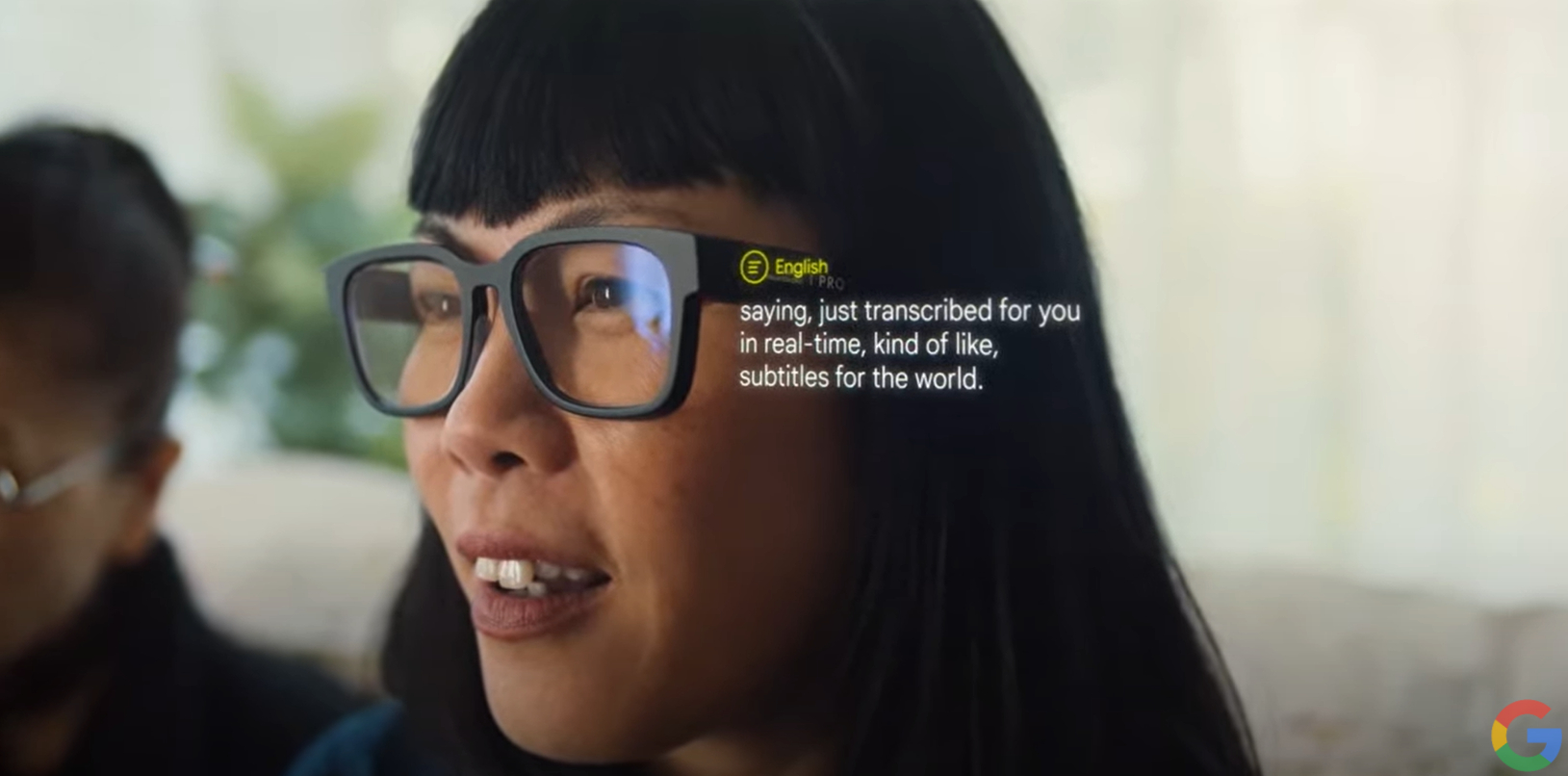
If you missed it, a slow Google IO built to a huge crescendo by the end of a marathon two-hour session; what started as a dull look through small Maps enhancements ended with the first look at Google's new Glass prototype.
Before that, we got the first look at Android 13, saw the new Pixel 6a phone (that will come in July for $449) and got shown the Pixel Buds Pro - which will cost $199 and launch alongside.
But there was more: the Pixel 7 and Pixel 7 Pro were previewed as coming this Fall, where they'll be joined by the new Pixel Watch, meaning the leaked device in the restaurant was real.
Oh, and there was the Pixel Tablet teased as well - there was so much happening, I nearly forgot about that.
Here's all the stuff that happened at the event, and you can see it appearing in real-time below:
- Google blows our minds with live translation glasses
- Google Pixel 7 has been 'announced', months before it's expected to launch
- Android tablets might finally get that iPad-beating update with Android 13
- A brand-new Google Pixel Tablet is coming, and it looks like a Home Hub let loose
- The Pixel Buds Pro are the AirPods Pro rivals we've been waiting for
- Google Pixel 6a announced to take on iPhone SE 3 at Google IO 2022
- Google Lens's new mode makes shopping dangerously easy
- Android 13 announced at Google IO 2022: everything we know so far
- This secret Google IO announcement is big news for fitness fans
- Can Google + Matter solve the biggest issue with smarthome tech?
- Google’s Skin Tone research is helping to make more inclusive AI
- Stop talking to Google Voice Assistant like a robot with new upgrades at Google IO 2022
- Google Maps brings immersive imagery, new features and more at Google IO 2022
- Google to update Multisearch feature with new features, local business information
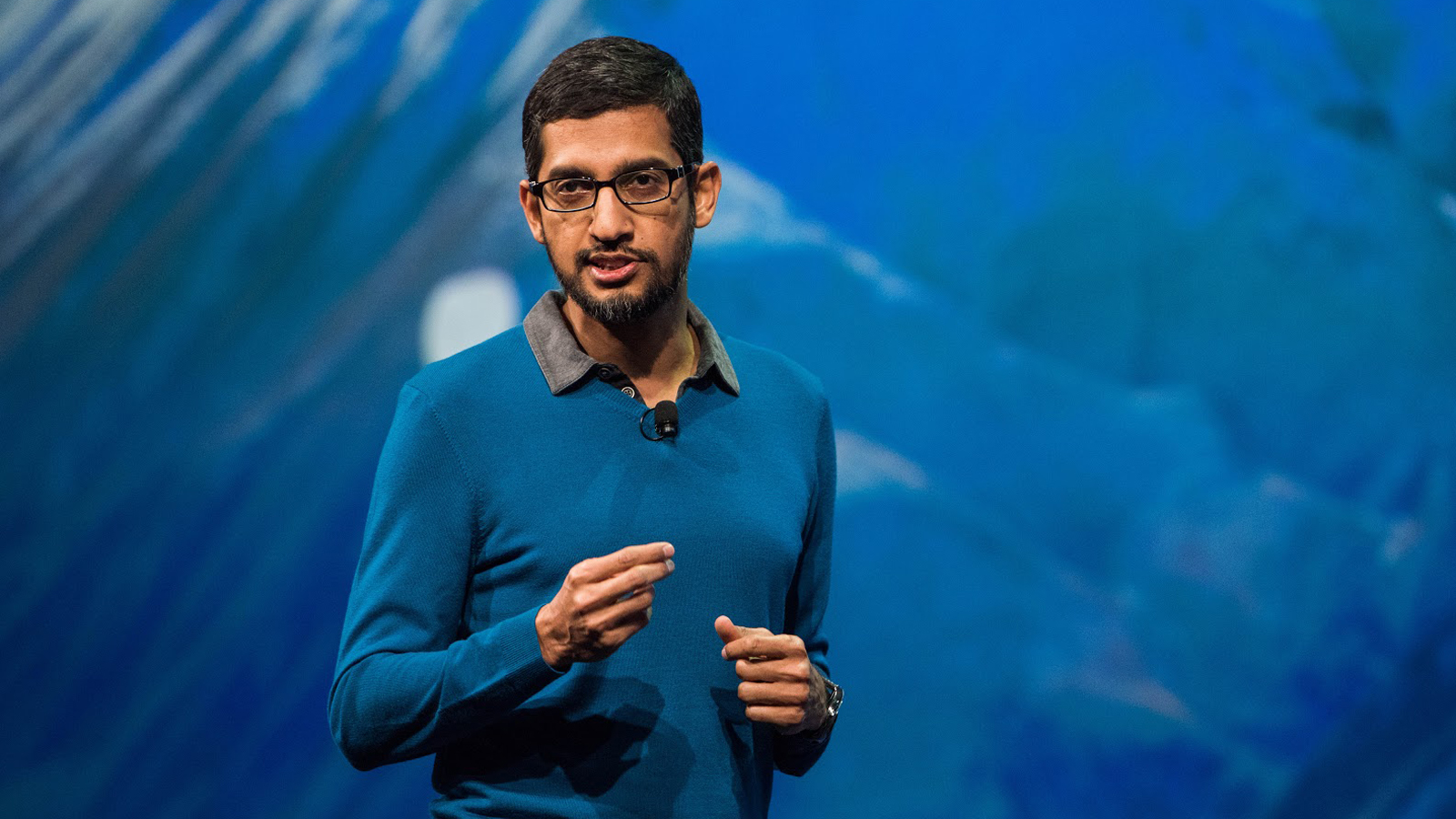
Goooooooood morning, tech fans! It's that time of year when stuff starts to get announced again, things begin to happen and we get ready for another round of launches, unveilings, and big events.
The iPhone 14 launch isn't too far away. Amazon Prime Day is just around the corner. The Samsung Galaxy Fold 4 is coming in a couple of months.
And I get to chat to you once again through the medium of a live blog - isn't that swell?
But I'm getting ahead of myself - today is all about Google, and Mr Pichai will be on stage in the Mountain View campus later today to tell us certainly about Android 13, probably about the new Pixel 6a and Pixel Watch (and some weird privacy and search features you never knew you needed) and maybe around some things tablets, headphones and the like.
It's in the not knowing that the excitement lies - let's get going throughout the day.
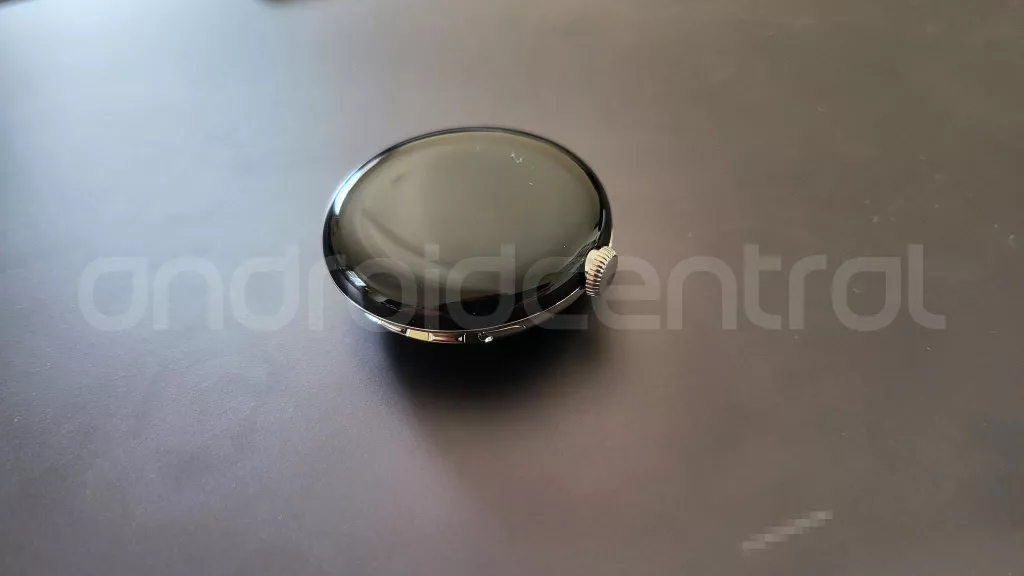
Let's kick the day off with my favorite rumor: that the Pixel Watch is coming and it was left in a restaurant by accident.
Our Future friends over at Android Central got the scoop on the device, publishing the pictures and news of the unit - however, it wouldn't power on fully (it seems to be a very early prototype), so they weren't able to get a full sense of what it actually offers.
It's an interesting design - the rounded face and more bulbous rear are quite something to behold. There will be proprietary Google bands, which you can see in the picture below, and it'll also pack a couple of hidden buttons that haven't been seen in renders.
Will we see the watch today? I think we will - the timings match up nicely - but like the iPhone 4 disguised as a 3GS that was left in a bar all those years ago, this could be a dummy design... let's see.
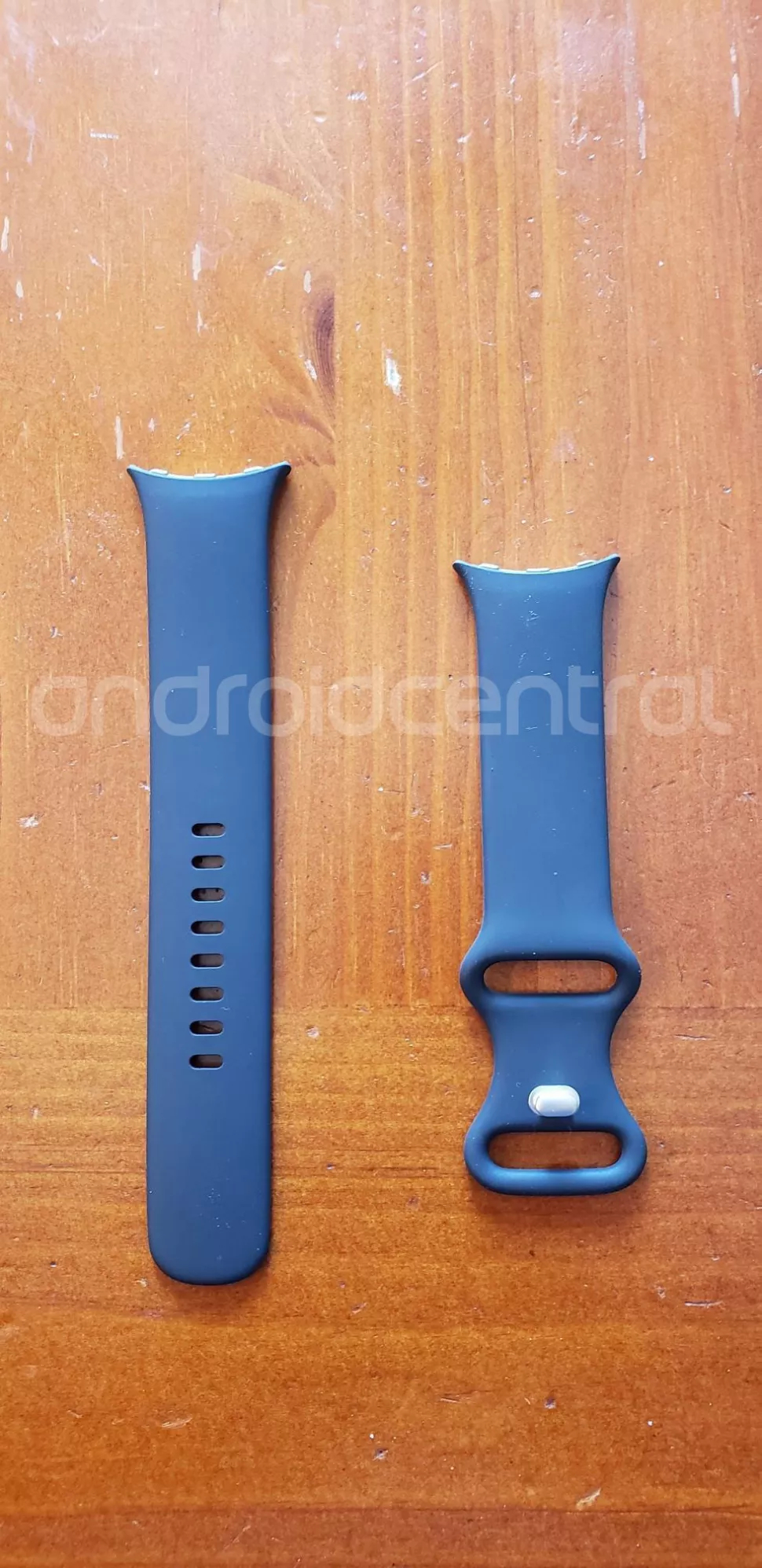
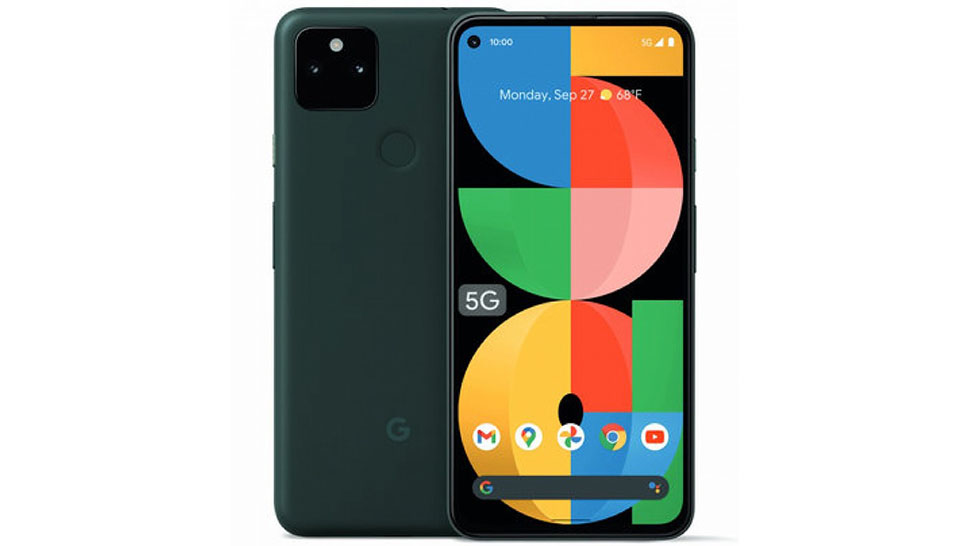
OK, the picture above is of the Pixel 5a, but today we're hoping to go one better than that and get the Pixel 6a shown off to us at Google IO.
While Google has announced 'A-series' phones at the IO events before, we're not sure that it's going to do so today - it's not certain, but if it does...
The Pixel 6 was a reinvention for the Pixel line, with a new design, better camera, the Tensor chipset made by Google and an overall nice design to the screen.
The Pixel 6a probably won't have a headphone jack, according to the rumors (the A-series has traditionally kept it) and be made of cheaper material to get the cost down.
The camera array will probably be lower-spec too, but of the Tensor chipset is kept, then the computational photography will more than make up the difference for the price.
And price is key - the Pixel 6a will undoubtedly be a more affordable phone, and that's going to excite a lot of people. It just depends on whether it appears today or not.
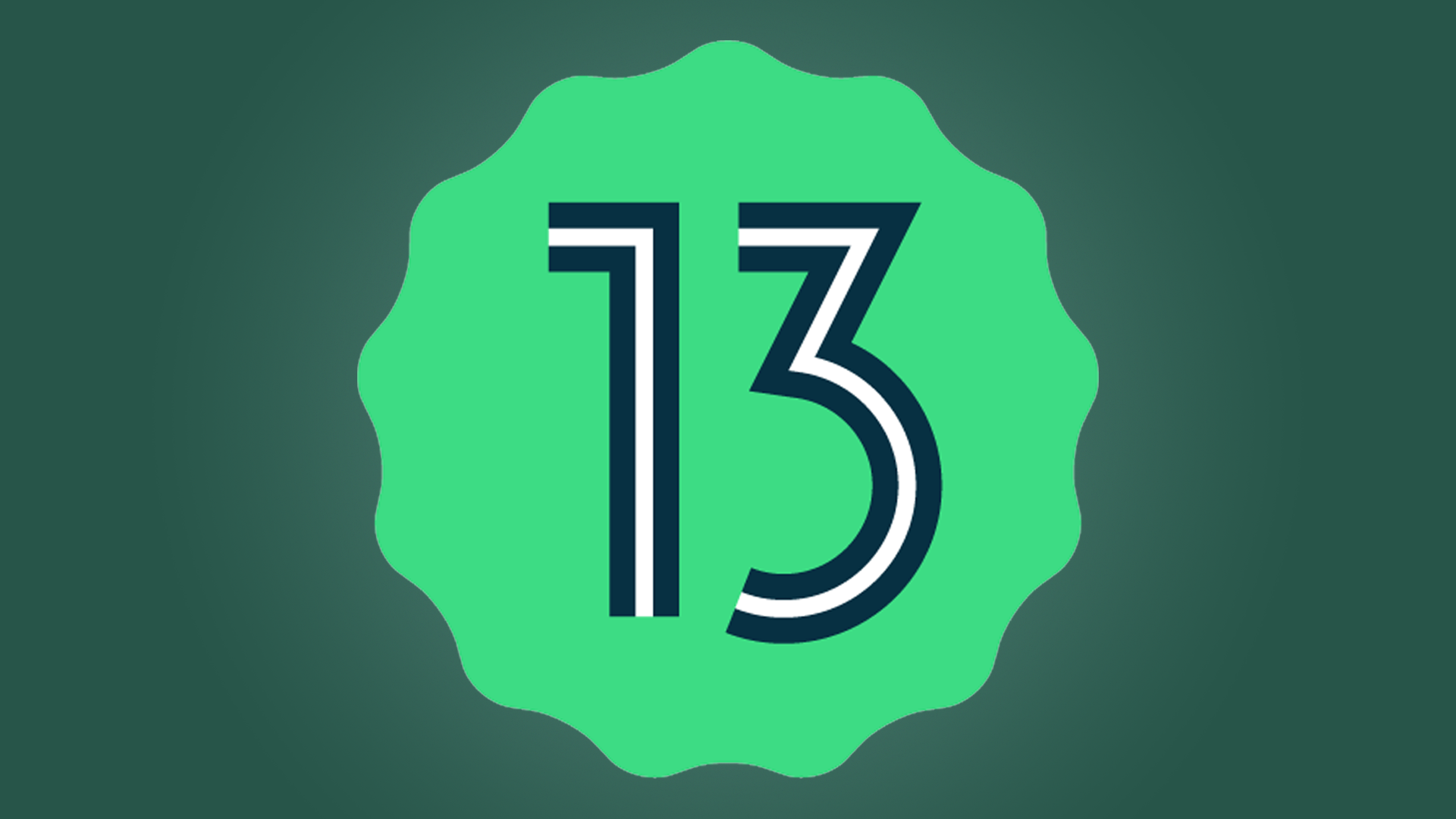
OK, I've got something exciting to tell you - we've resurrected the TechRadar Rumor Meter for our Google IO hub, so you know what's going to be coming based on our sleuthing.
So let's look into our first dead cert: Android 13 is coming, as you can see by our hot thermometer:

What can you expect from Android 13? Well, we've got the full rundown over in our dedicated hub, but as the beta preview has been live since February we do know a few features that are coming with it.
They're not hugely illuminating, more focusing on the underlying code, but things like dynamic theming being expanded, allowing third party apps to work with themes and changing icons to match the coloring, are on their way.
It appears that this new version of Android - codenamed Tiramisu, taking things back to the days of Android iterations being named after puddings.
Things like 'Material You', the overall look and feel of Android 13, will have a lot of interesting visual elements that are changed to match each other - an easier audio picker, sleeker clipboard etc are all on their way and we'll hear much more about them today, rather than having to scan through myriad developer preview findings.
(If you are looking for a good, deep dive into what's been found in those developer previews, Android Central has a great run down of what it's found - do go and check it out).
Look, I'm not saying Google needs to up its social media game today, but... actually, no, that's precisely what I'm saying.
🔜 #GoogleIO!May 10, 2022
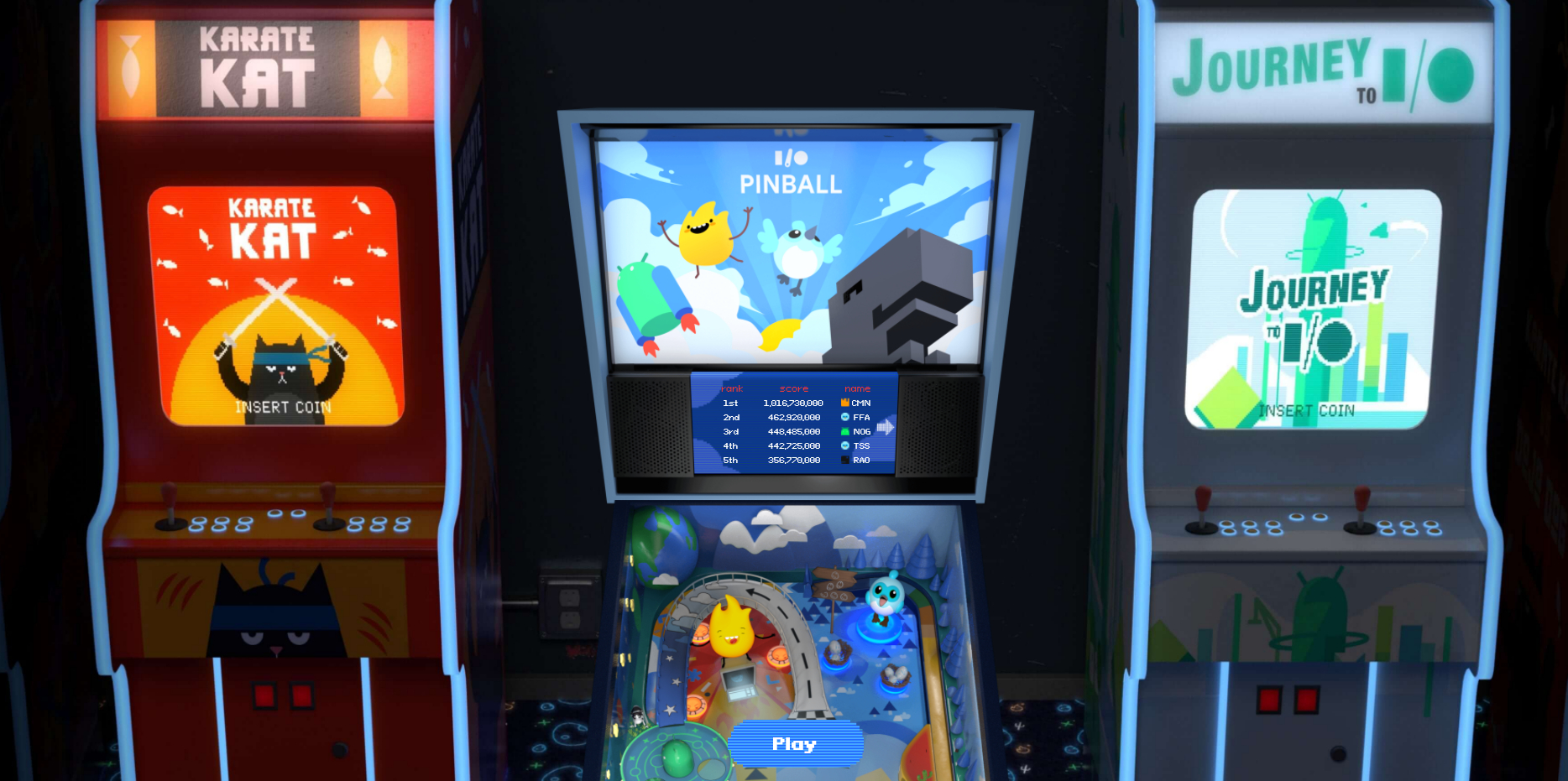
Right, did you know that Google has released a game of I/O Pinball that you can play as you get jazzed up for the developer conference today?
It's easy to get hung up on the hardware that will be shown off today - but this is designed to get people interested in the developer tools that Google is offering embedding more devs in the world and offering them to make money or enjoy their passions.
The pinball game allows you to choose one of the mascots from the Google world (we chose Chrome's dinosaur) and then play the basic pinball game. There are loads of ways to get a high score, but I won't lie: this game annoyed me.
It's slow to run and I missed the zip of Pinball 3D that Windows used to pack in the olden days of computing. I also could enter any of my initials onto the leaderboard, so I couldn't log my score. Which made me sad.
That said, it's built on Google's Flutter platform, and is designed to show what can be done, rather than creating the next AAA title for the PS5.
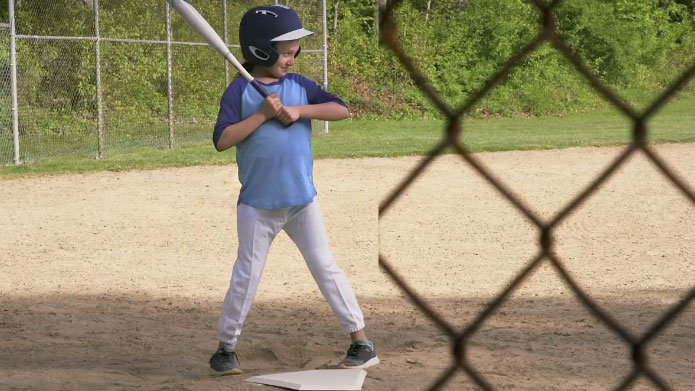
Now, we've been covering Google IO for a fair few years now - my Global Managing Editor John McCann just reminded me of something:
Google will often announce stuff and then not do anything with it for a long time - if ever. Take the image above - when Google Lens was announced in 2017, it was shown off with this incredible tool: you could remove the chain link fence in the foreground to just get the baseball shot.
Now, it was only really in 2021 that it appeared on phones - the Google Pixel 6 launched with the ability to remove items in the background of photos - dubbed Magic Erase - and that's five years later.
So if you see any cool new ideas from Google today... get ready to possibly be waiting a while.
While we're talking about things that happened at old Google IO events, check out this hilarious tweet from 2014:
This is at the Google campus. Didn't think it was going this badly for the wearable. pic.twitter.com/3HTRtJNqdMJune 25, 2014
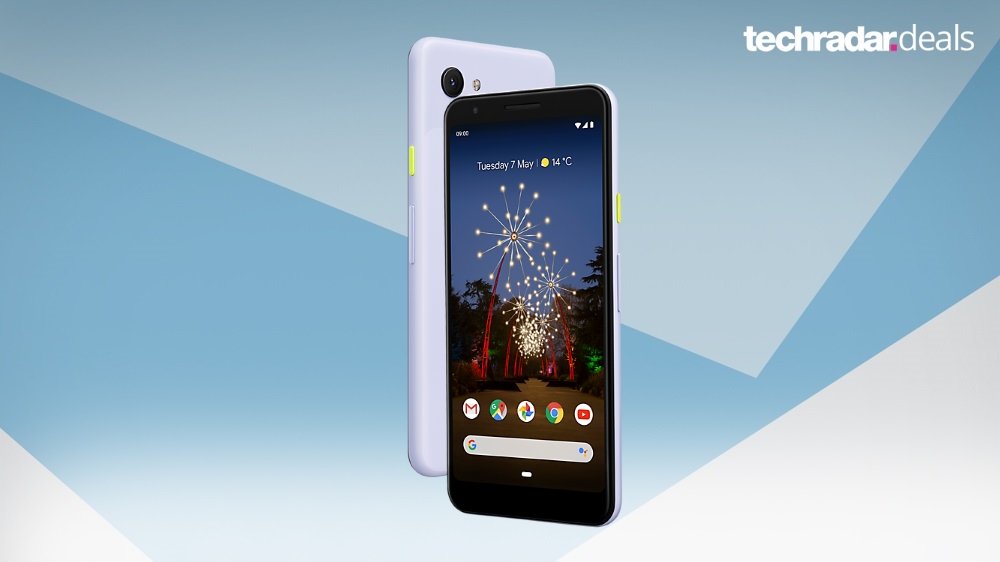
Anyone remember the Pixel 3a? It was a top phone. Brought back the headphone jack in 2019, had 'active edges' that you could squeeze to make things happen, was a low cost device... I liked the idea a lot.
There's a lot of chat that we won't be seeing the Pixel 6a today, which would be a shame. But I remember the closeness of the Pixel 3a with the HTC range of phones... I'd love to see that kind of innovation today rather than just a basic 'low-cost' refresh of the Pixel 6.

Well, would you look at that - only an hour-and-a-bit until everything kicks off. The main Google IO page is showing a lovely fancy clock, and is playing music alongside that's both relaxing and maddening, because it also sounds a little like someone's phone is ringing.
(I know this because I just played it in the office and everyone looked at me like I wasn't answering my phone).
Can confirm Google is sending slime to some people ahead of the Google IO event today:
Who is excited for #GoogleIO today? Thank you Google for getting me ready for the stream! What do you think will be announced besides Android 13? New Phone? New Watch? Looking forward to this BINGO 🤣#GiftfromGoogle pic.twitter.com/dKP9idkcgvMay 11, 2022

We heard from John McCann, TechRadar's Global Managing Editor, earlier today - but we've been chatting about IO's past (we've been plugging away at this since the early 2010s), and he's looking forward to some slightly different things to me:
"Google IO always produces an intriguing story line or two, whether it's camera features that appear more like witch-craft than reality, or a slightly-too-creepy AI that answers phone calls for you, the search giant is likely to give us a window into the future of mobiles - and one that could well be still a few years off.
"Of course, a lot of what will be revealed about Android 13 and its other software platforms will come to market within the next 12 months, but the most exciting (or worrying, depending on your view) reveals will probably be a little further away from becoming part of our daily lives."
Remember when I said earlier about the deep dives into Android 13? I've just come across the mother of them all from the Editor of the Android Edge newsletter (among other things), Mishaal Rahman.
This is the changelog of everything that's come in the Android 13 based on the developer previews - the most recent shows support for head tracking sensors, for instance, or the recent addition of stylus support.
I won't lie, it's a bit of a heavy read, but it's bloomin' comprehensive if you're into that kinda thing.
There's no doubt we'll see new #Android13 features at #GoogleIO in a few hours, but there's no need to wait for the keynote — I just updated my Android 13 deep dive article with 10 new sections, covering some pretty big changes!https://t.co/mnZcEusRLEHere's a summary: pic.twitter.com/xcZjVX60EOMay 11, 2022
Have you ever met Daryl Baxter? He's our Software Writer (as in, he writes about it, not codes for us) and he's pretty nonplussed for the Google IO push this year):
"From testing the public beta of Android 13 these last couple of weeks, it feels like a subdued update for Android this year. We might see another version just for tablets as a curveball later today, but otherwise, 13 looks like a refinement of what was released last year."
IT IS LIKE THE BEFORE TIMES, LANCE.
It's like before times (though I think the crowd size is significantly smaller). #GoogleIO https://t.co/l9BxrVWnzlMay 11, 2022
OK, we're two minutes away - enough time for me to point you in the direction of a thing that we don't think will land at IO this year, but we still think should happen: The Pixel Buds Pro.
Check out our run down of the minor rumors that abound on them, but more imporatantly: what we need to see.
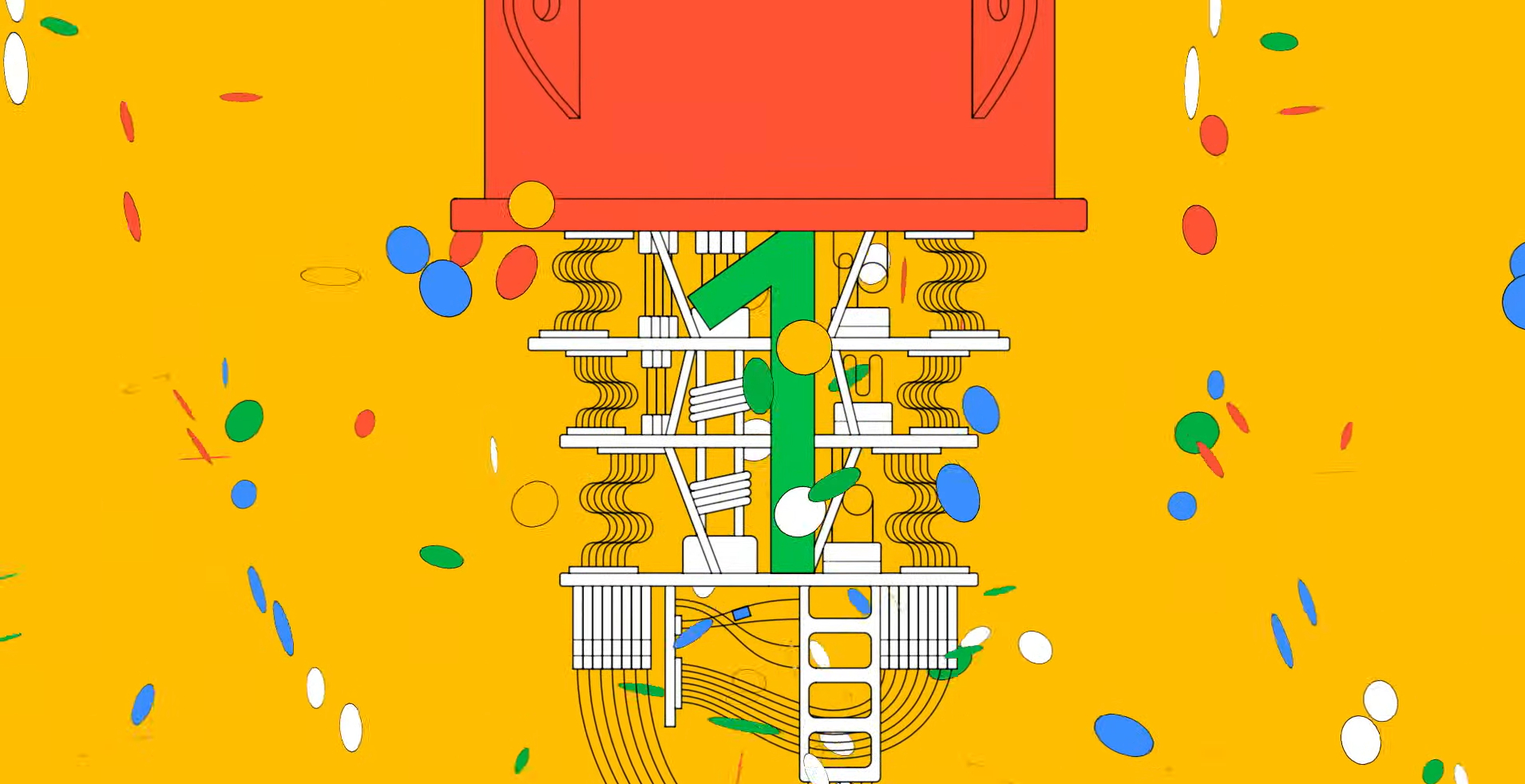
Game time.
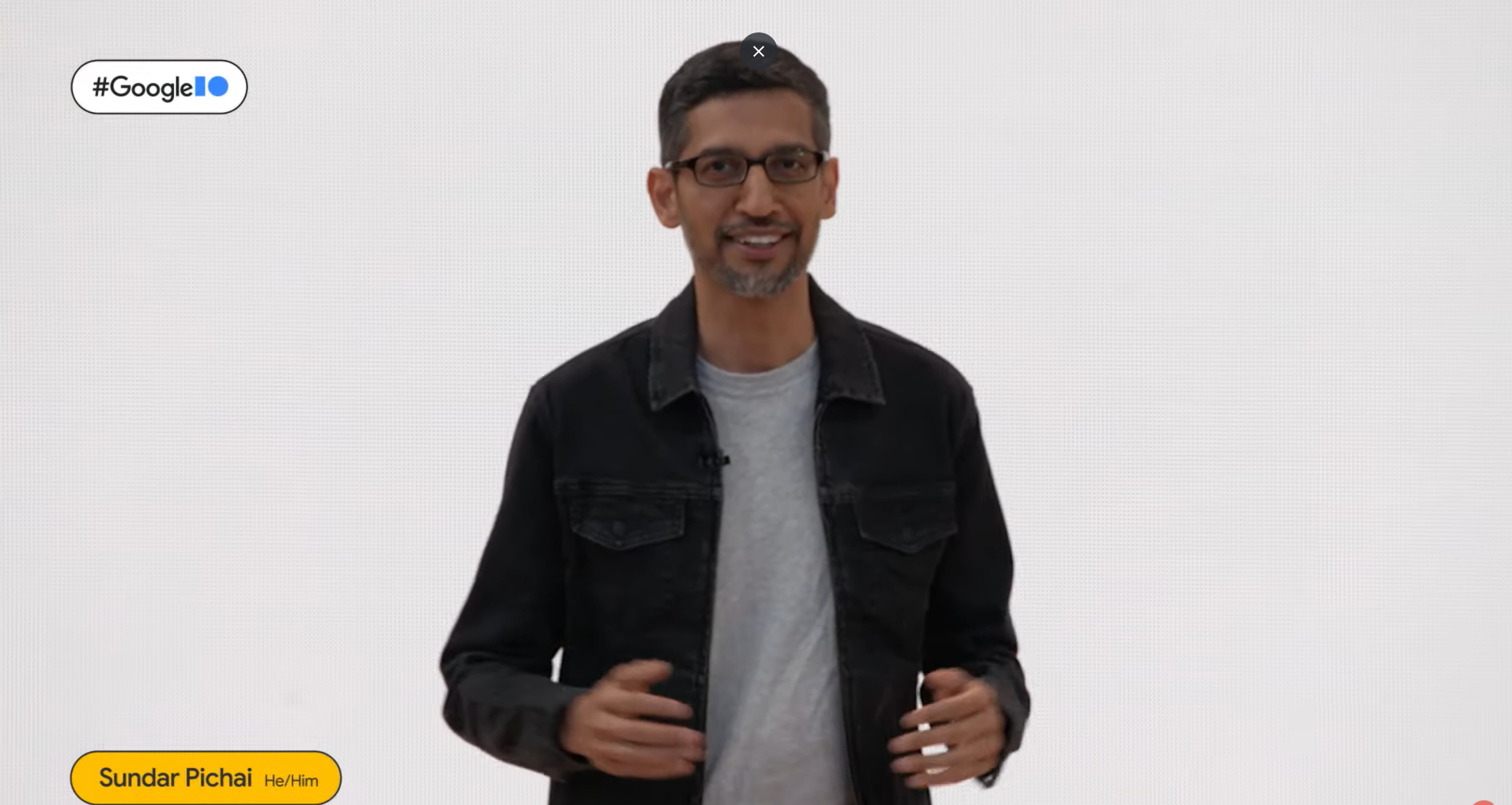
First up, we're hearing about how great Google is at doing things safely online, following Maps, solving problems with solutions that help connect people... but basically it's a big search engine.
What does this tell us about the theme of the day? That Google is 'built to help'.
Here comes Sir Sundar.
Great joke to start - asking if people can hear him because of being on mute at the start of every meeting.
Love it if he'd said 'on Zoom' rather than Google Meet.
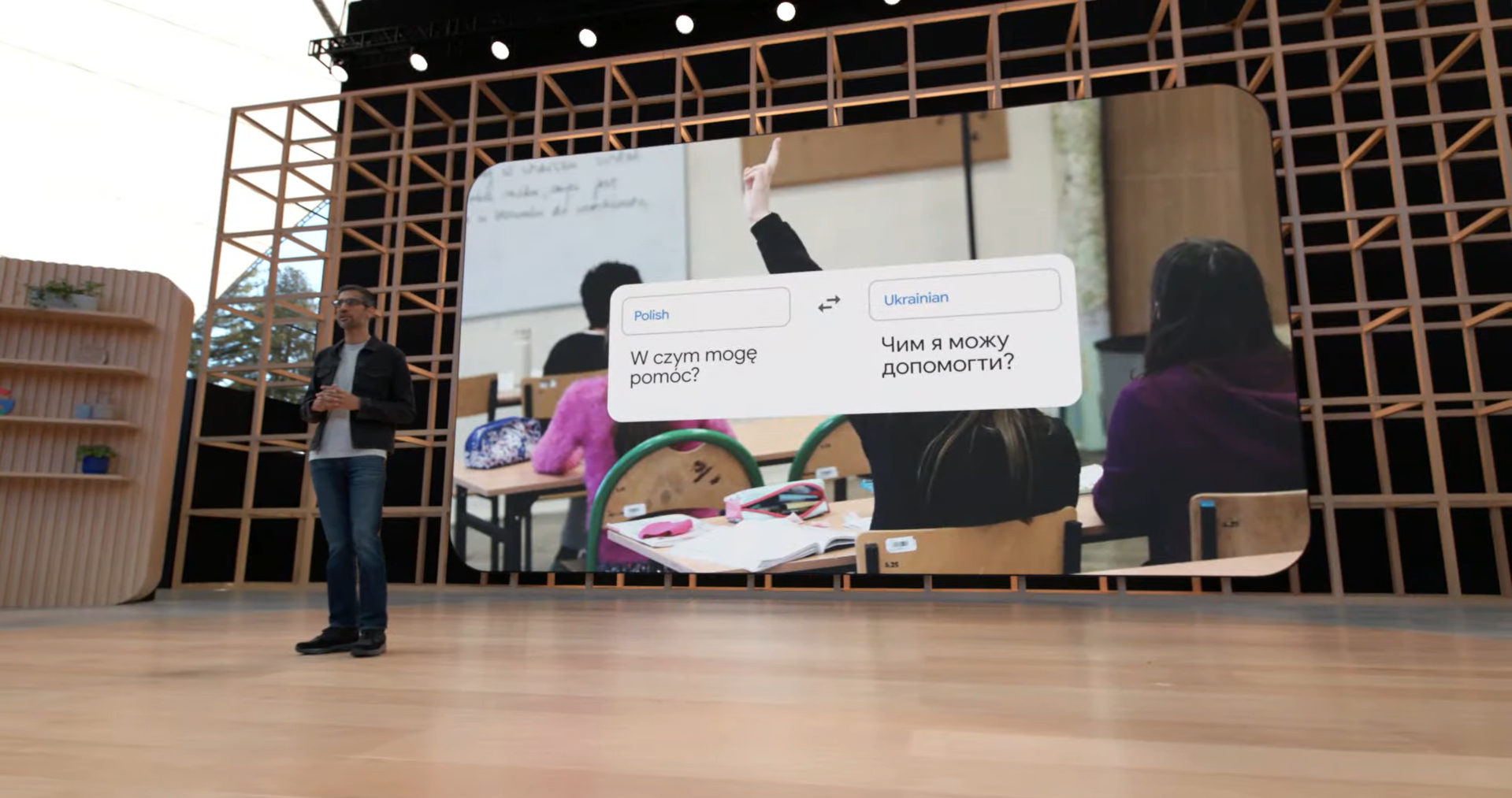
Today we're going to see how Google's products are 'built to help', both online and physical (I assume).
Hearing about flood alerts in India, Covid vaccine information, Air raid alerts in Ukraine (that got applause) - we're hearing more about Sundar's time in Poland, and how Google Translate has been a key tool.
Hearing a bit more about Google Translation tool - the issue is that there aren't many bilingual texts. However, there's a new plan from Google to automatically work out how to bilingually translate text - and 24 new languages are being added, including indigenous language.
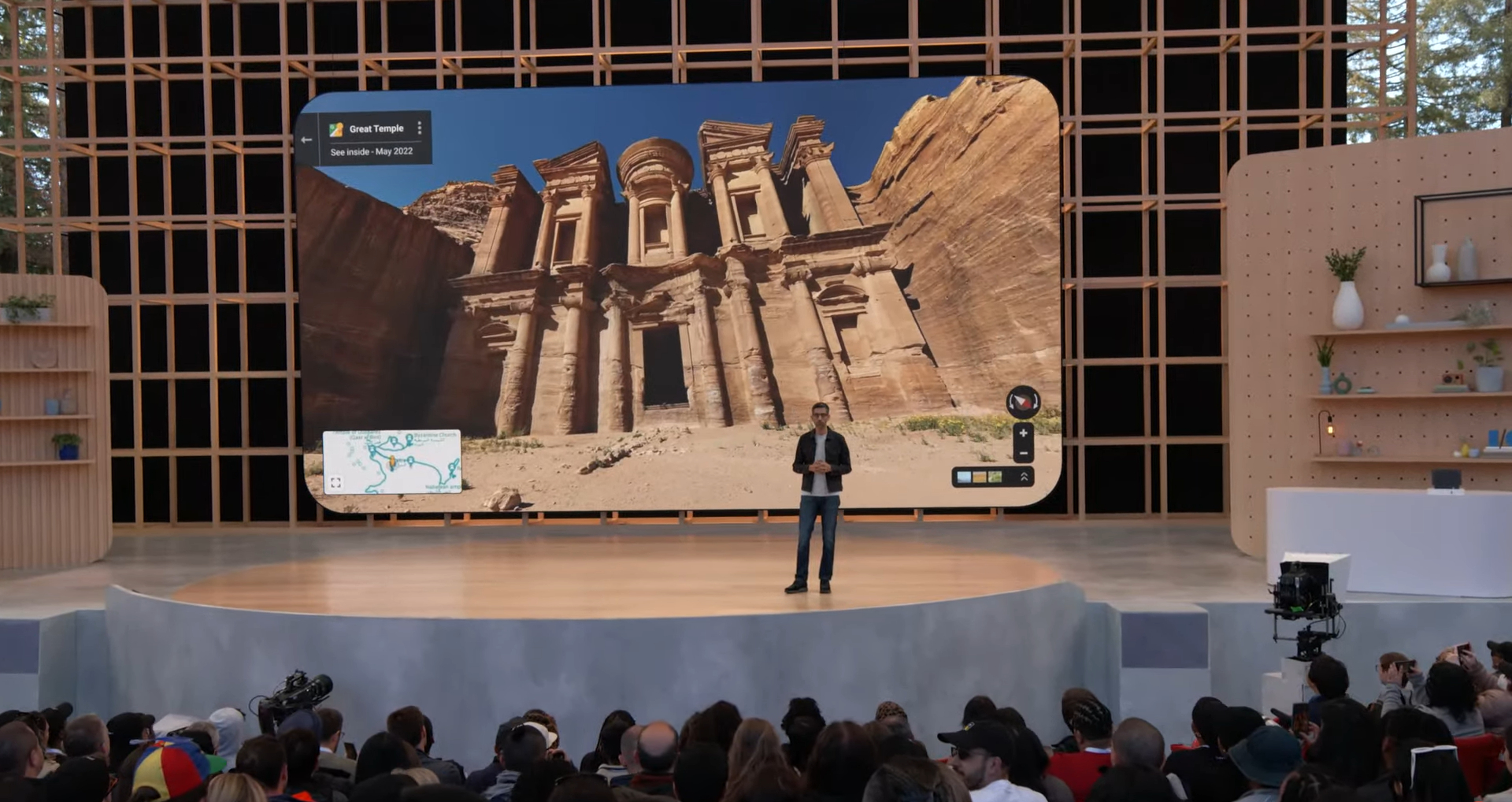
Now we're hearing about how great Google Maps is - where it can detect new buildings, and are able to to provide support in emergency assistance, and learning about population density.
Google is also using new technology in Maps, called Immersive View, it will show what's going on live - you can look inside restaurants using neural rendering to have a 3D fly around, like a drone.
These features are coming later this year to select cities - but it's not clear if this is Immersive View is real time or just taking images and stitching them together.
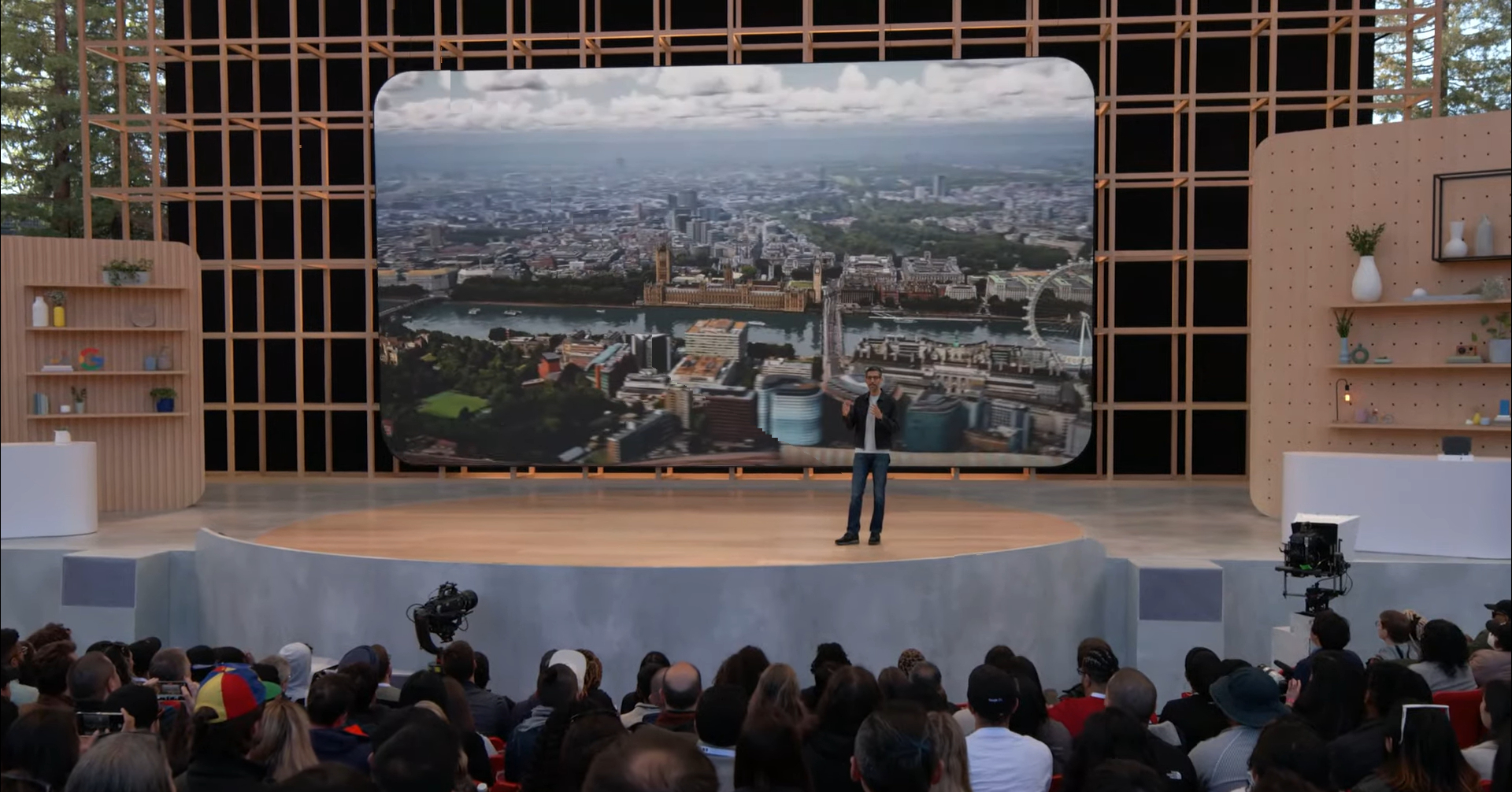
Oooh, here comes YouTube. Previously, we heard about auto-generated chapters, but now Deep Mind tech is doing more to generate 10 times more videos with auto-chapters, and speech recognition transcripts are coming to Android and iOS.
And, in 16 languages, captions will be auto-translated, with Ukrainian videos coming next month to add accurate information about the war.
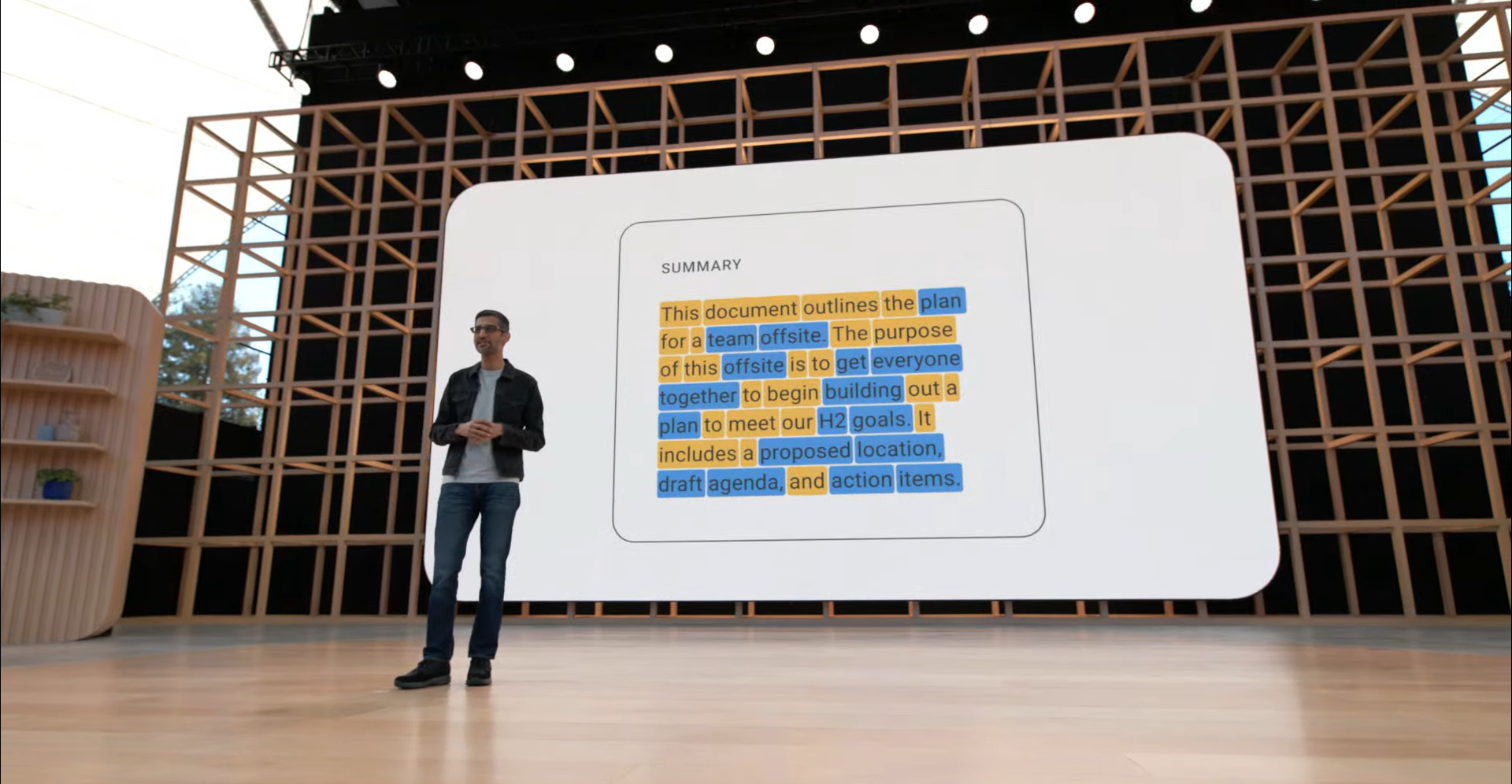
Oooh, big cheer for automatic summarising Google Docs, showing people what has been happening in the piece.
And coming soon, the same for Google Chat, so you can get an update when you've been away from the laptop for a while, and you can catch up on meetings more easily.
Now we're onto Project Starlight and what Google has learned - making video auto-improved, and bringing 'studio quality' virtual lighting so you can change where the lighting actually is with live rendering.
This is 'being tested' which makes me think it'll be months away.
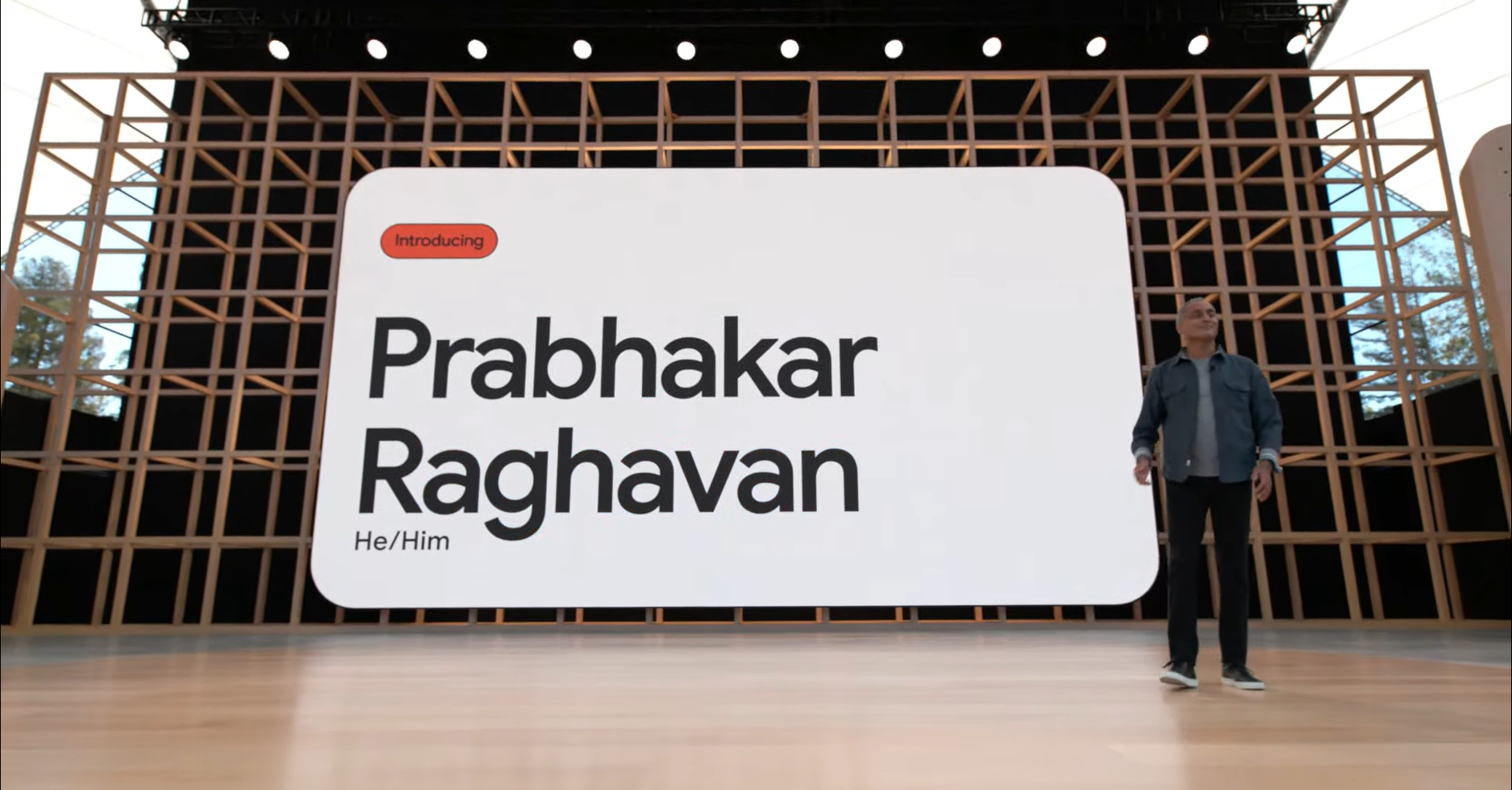
Big changes to search are being talked about now - 'search reimagined', but we've heard this before.
Hearing more about how Google is getting better at understanding queries based on the keywords and what people want. Then came in voice search - different countries use this more than others.
Then came Google Lens - 2017, if you remember, live blog fans - and it's used eight billion times a month.
So what's next? Last month came Multisearch, where you can take a photo and ask a question, to be more related.
'This is just the beginning'... later this year, you can search locally - take a picture or grab one online, and ask the qu, and it will work for you.
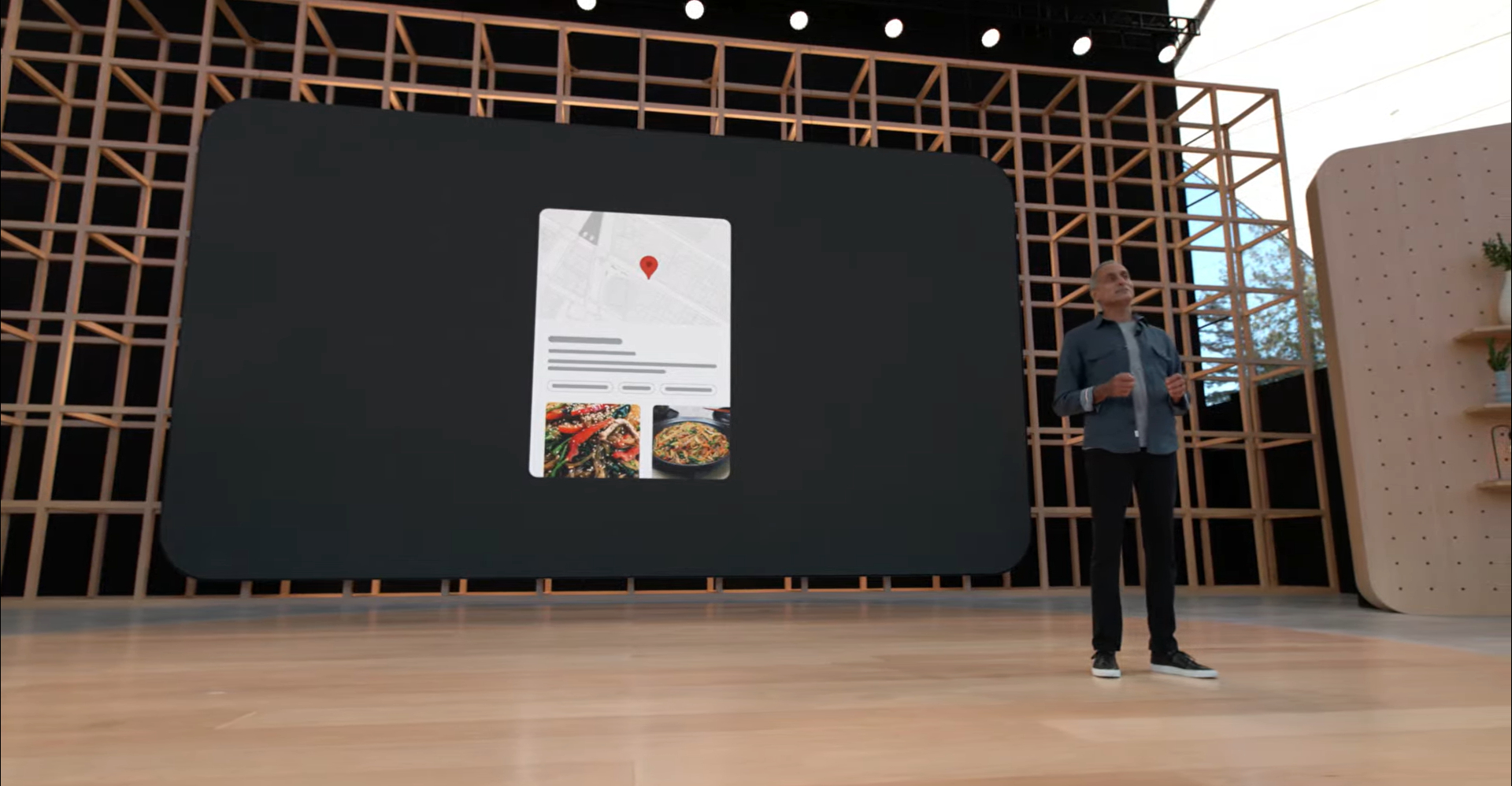
In the future, you can do this with the camera - so you want to pick out the best candy bar? It needs to be great, nut-free and dark chocolate - and in the future you can ask this and see insights from web searches in front of you.
Like a 'supercharged CTRL-F' for the world around you. I like that description.
Google is now talking how Google is focusing on skin equality in its products, talking about the research with Dr Ellis Monk who is trying to dig more deeply into issues of racial inequality.
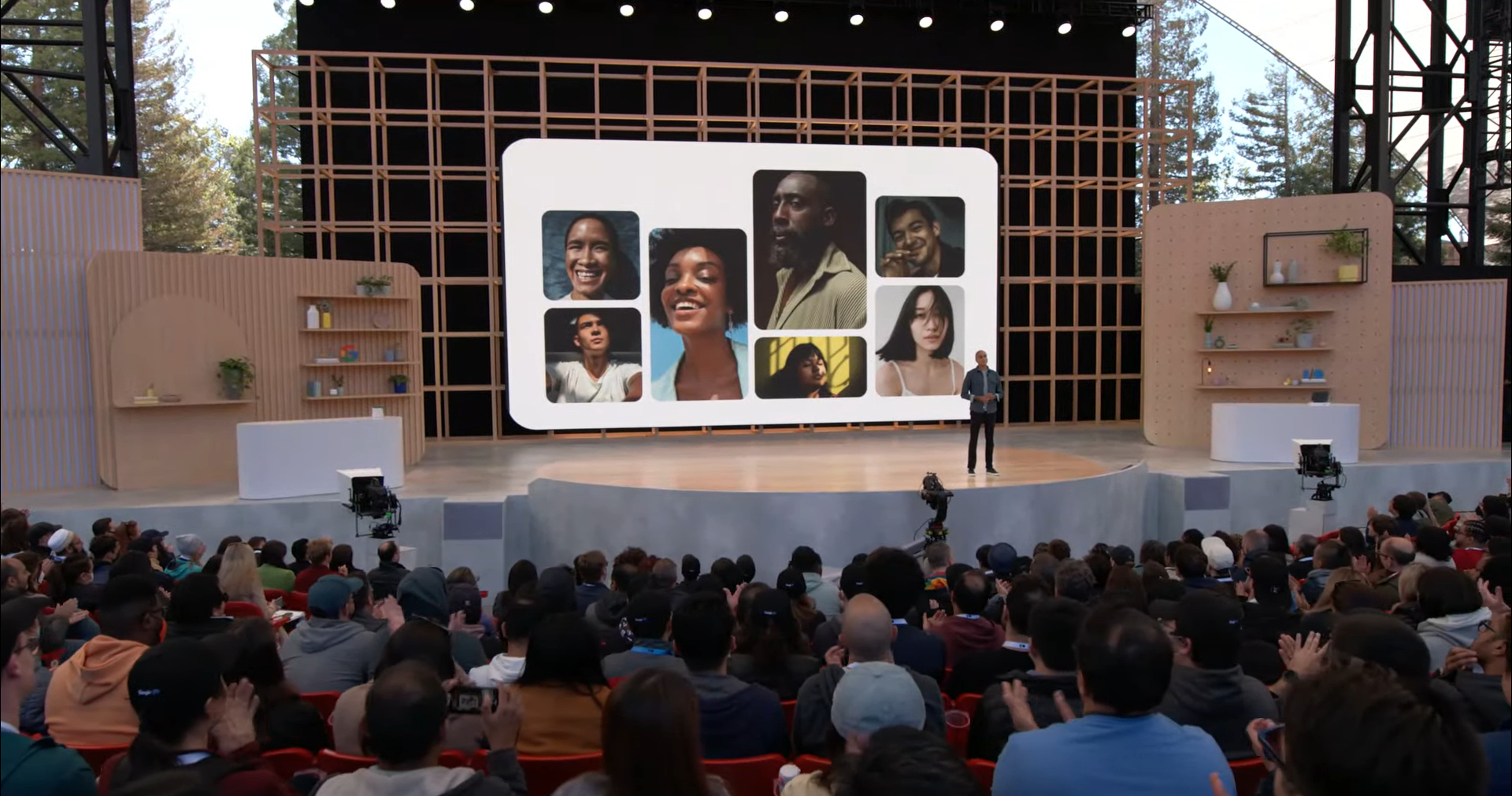
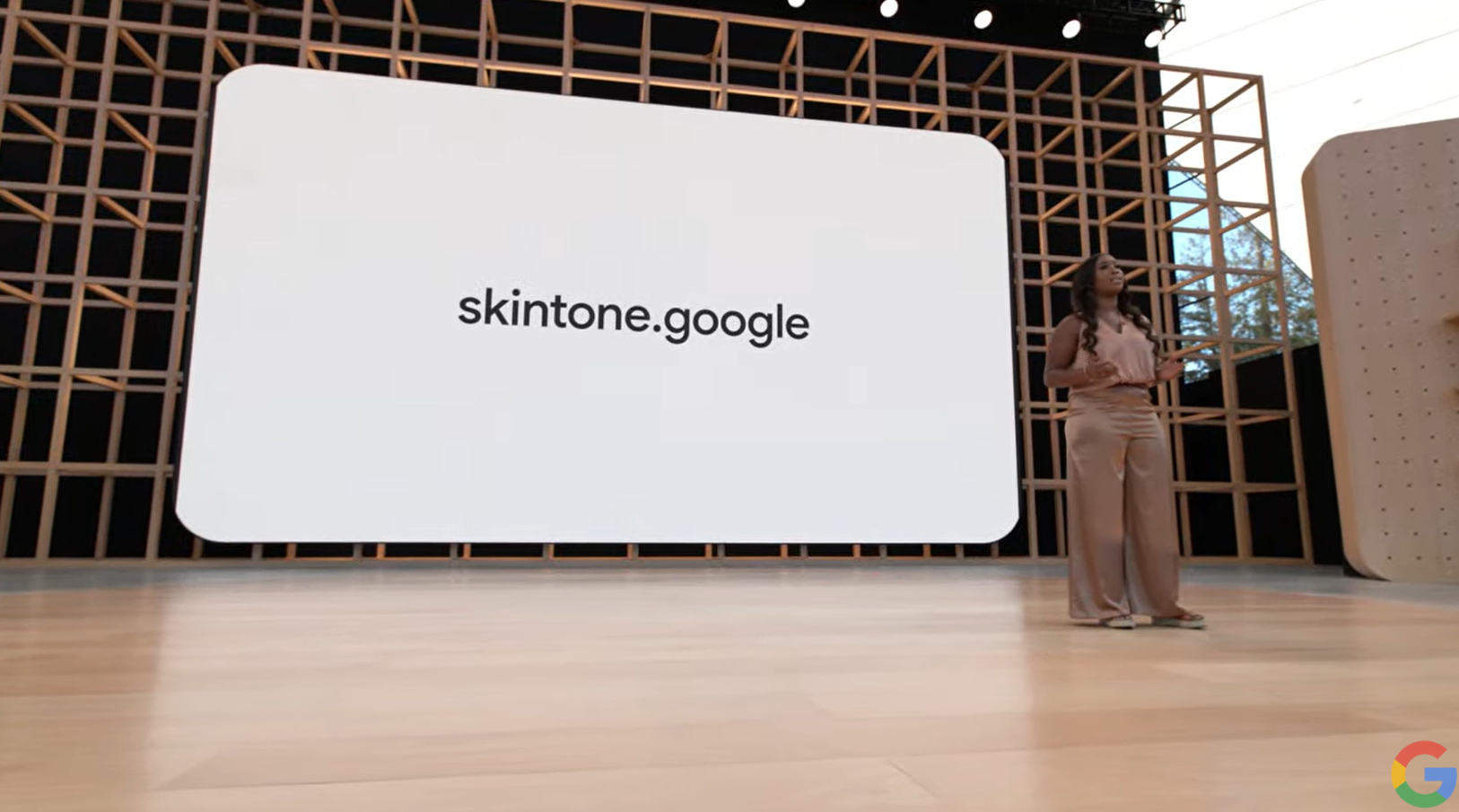
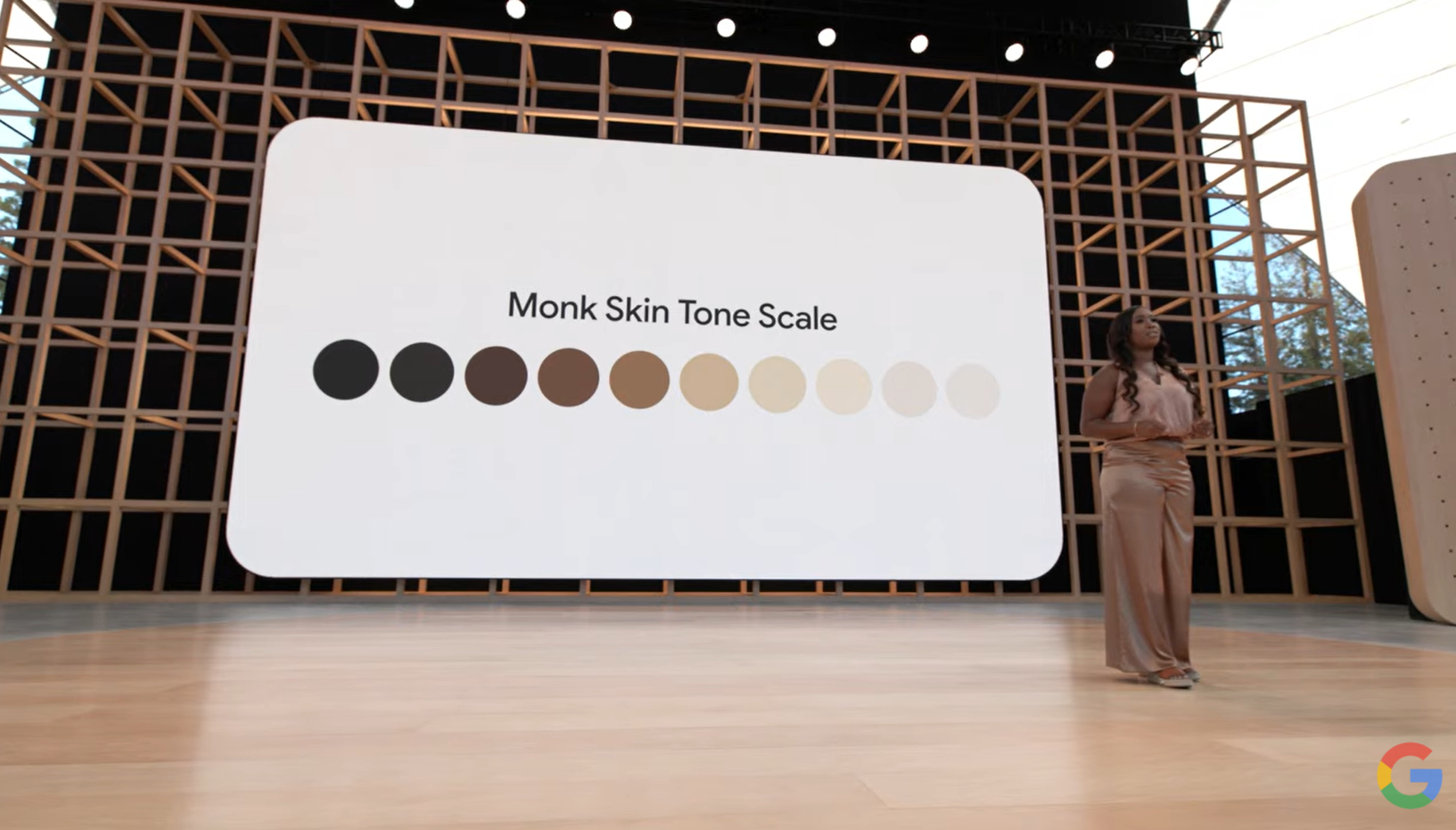
The goal being spoken about is for the tech industry to start making the world more accessible for people of all colors - Annie Jean Baptiste on stage now to talk about trying to help people feel more validated.
Using Dr Monk's Skin Tone Scale, where product testing and the technology powering features works well for everyone. This will help more accurately represent skin tone, especially for those with darker skin tones.
Google search images will show more diverse skin tones in search, and will make it easier to find skin tones that better fit what you're searching for if you're looking for something like make-up or similar.
The Monk Scale is also being used to improve Google Photos, with real tone filters that work far better across skin tones.
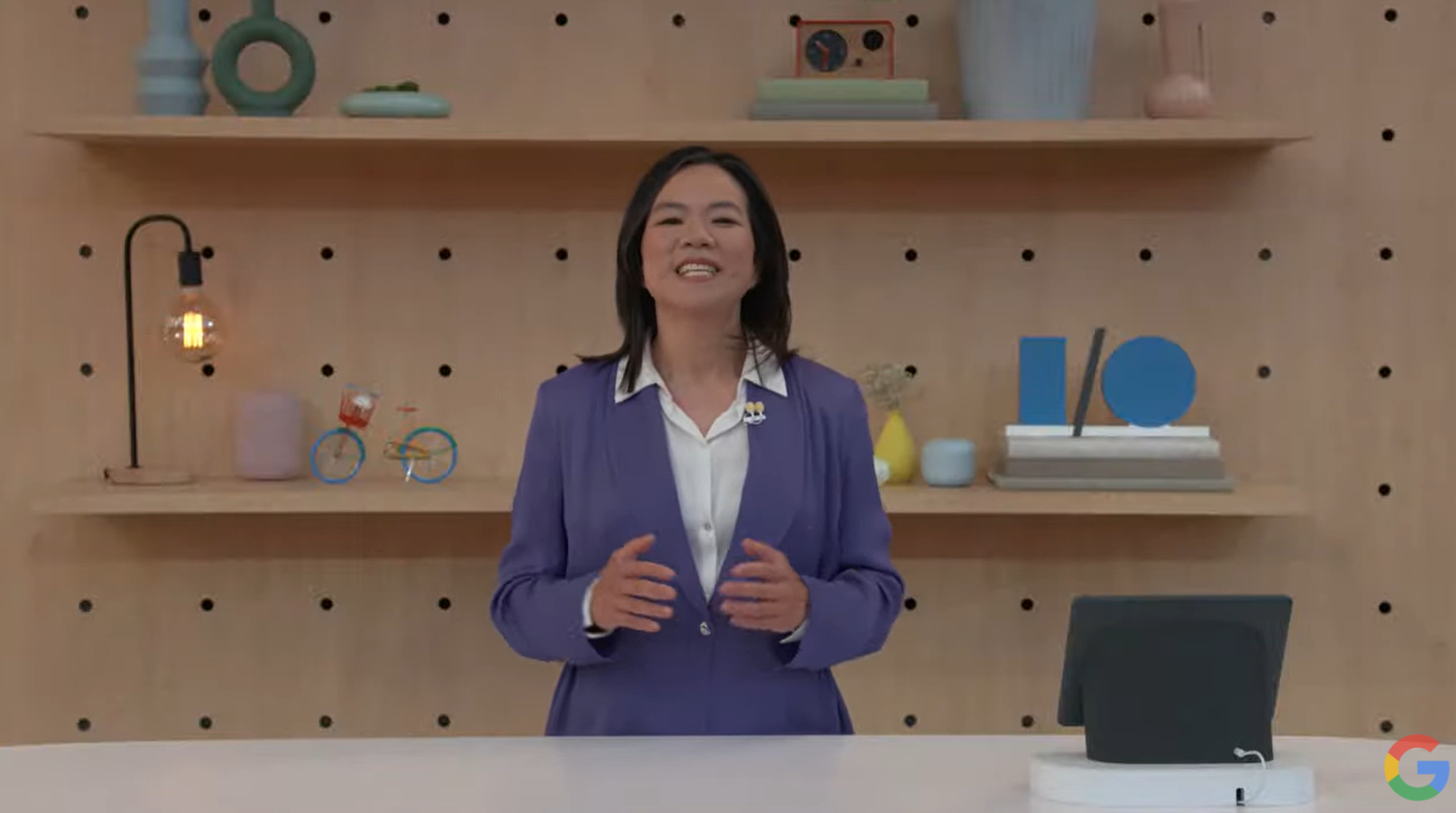
Now we're talking about 'computers adapting to people, not the other way around' - this is going to be about Accessibility, with Sissie Hsiao.
To start, Look and Talk is coming to Nest Hub Max, as it know when Face and Voice Match know it's you - it's opt-in, and processed on device and not shared.
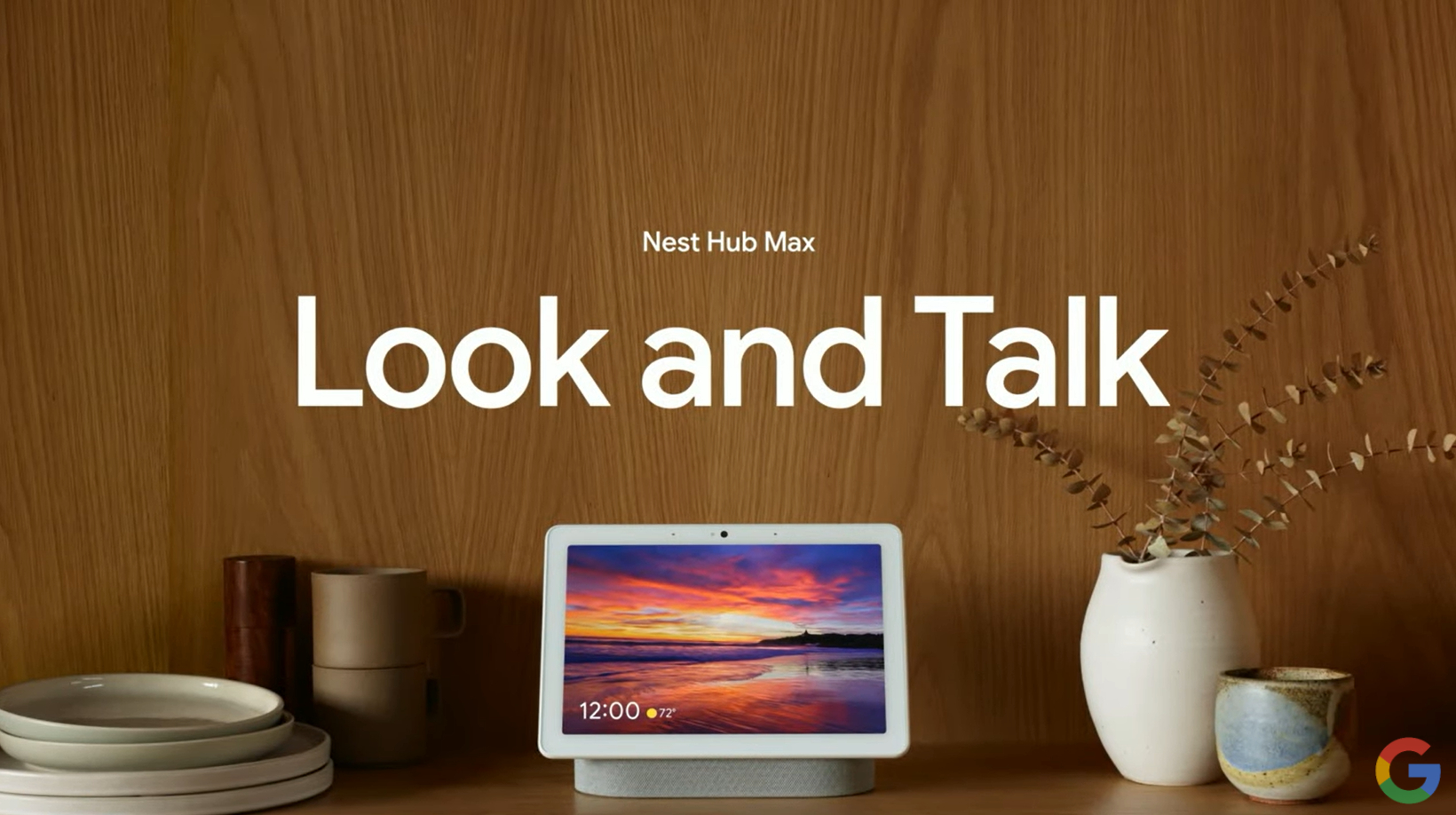
Demo time! She just looks over at the Hub max and starts talking, activating the search functionality with just a glance.
The text is large and visible - this is designed to not keep saying 'OK Google' (and note she didn't say it, so everyone's phone didn't fire up...)
The Monk Skin Tone Scale will be used here again, making sure more people can be registered for glances.
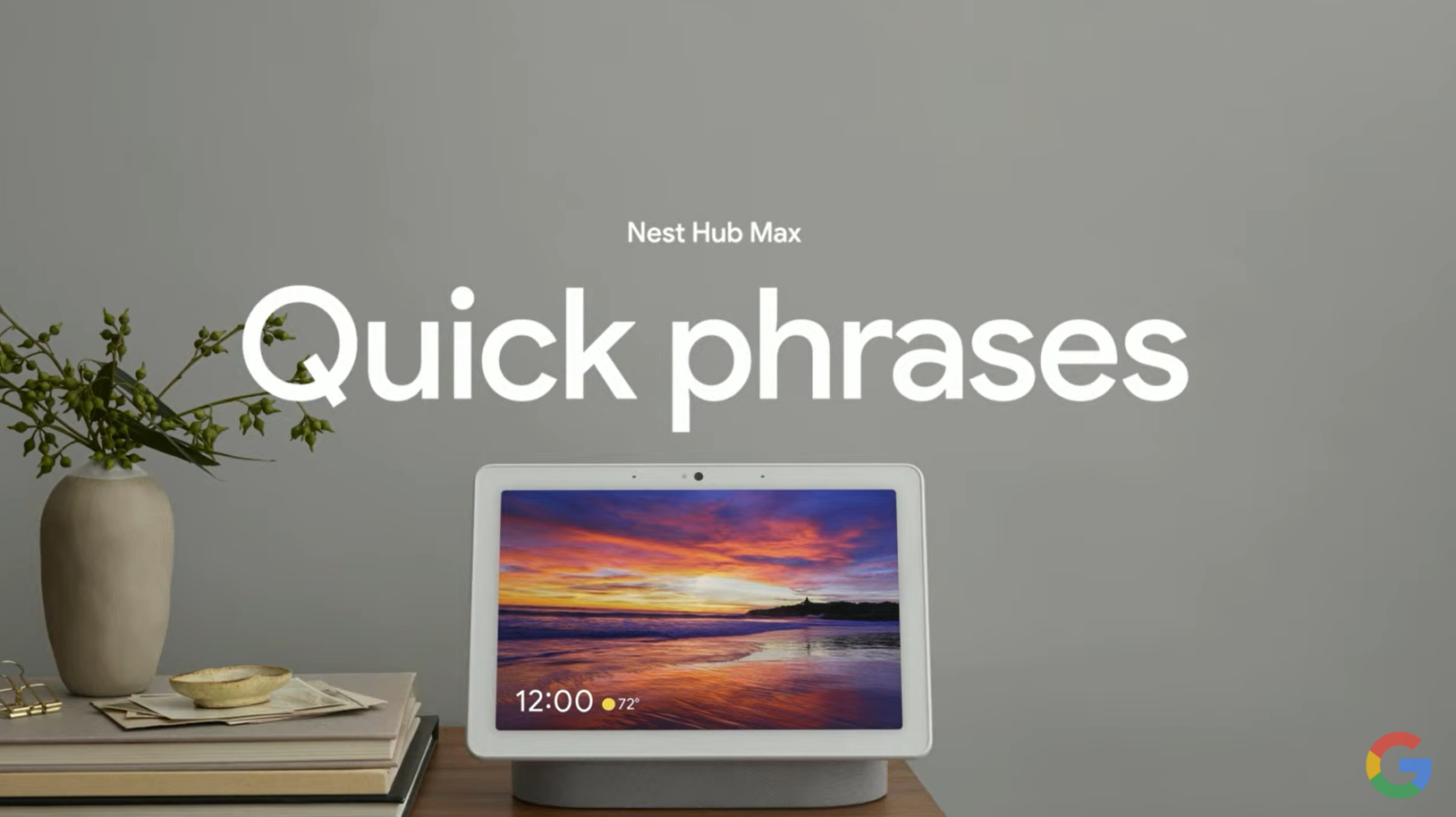
Google is allowing more Quick Phrases, so it will spot if they're said - a lot of mentionings of 'privacy' and 'opt-in'.
Google is making more intense neural networks, with the new Google Tensor chip - it will listen for pauses in what you say or when you stumble, and it will 'gently' ping you to correct the thought.
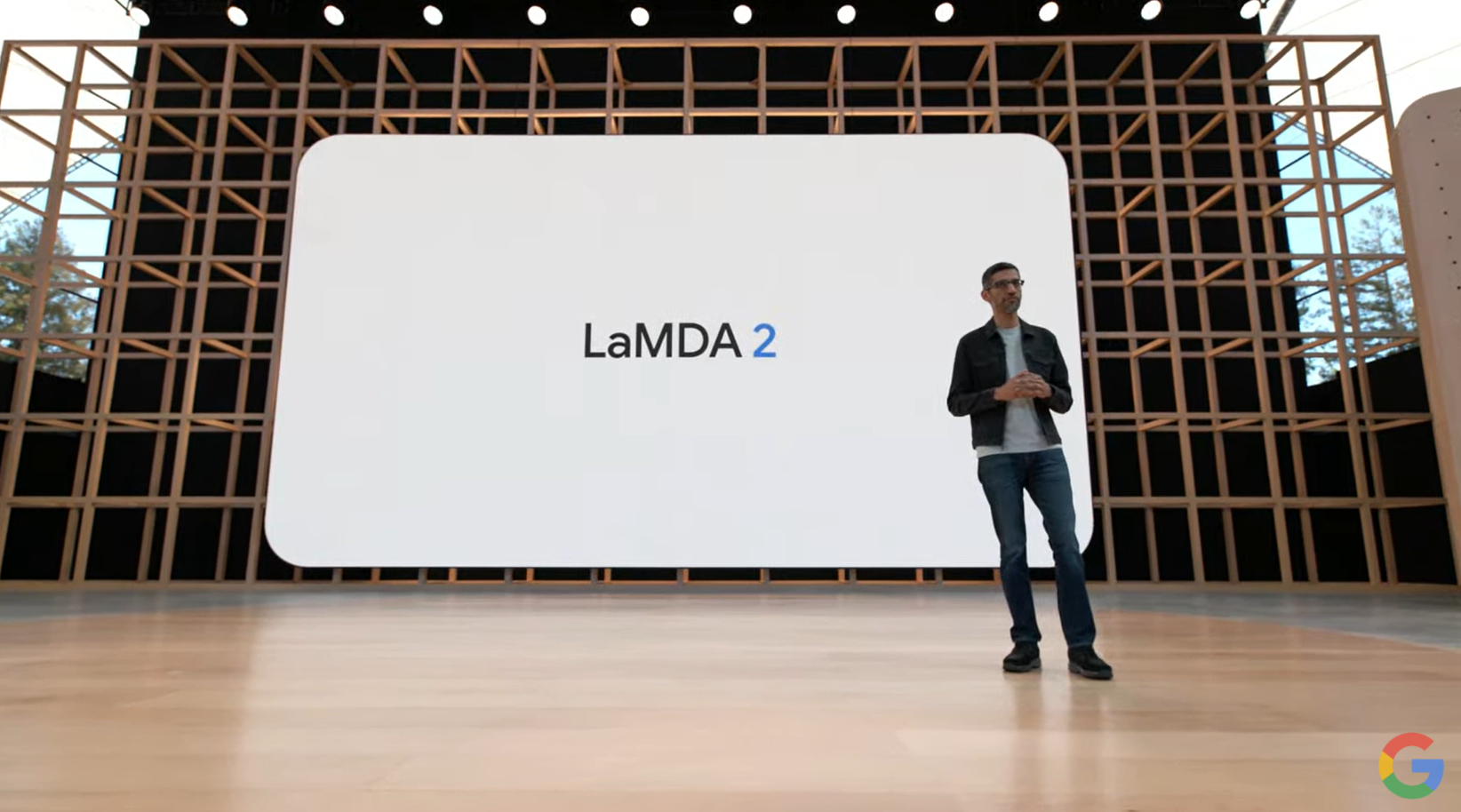
Now we're hearing about Google's new look into AI - with AI Kitchen, you can test things.
Whoa, this does some scary things. You can ask it to imagine that you're in the bottom of the ocean, and the things you can smell, see, what the stuff you look at is actually doing - this is now taking our imaginations away from us too.
This is how AI starts writing our stories for us.
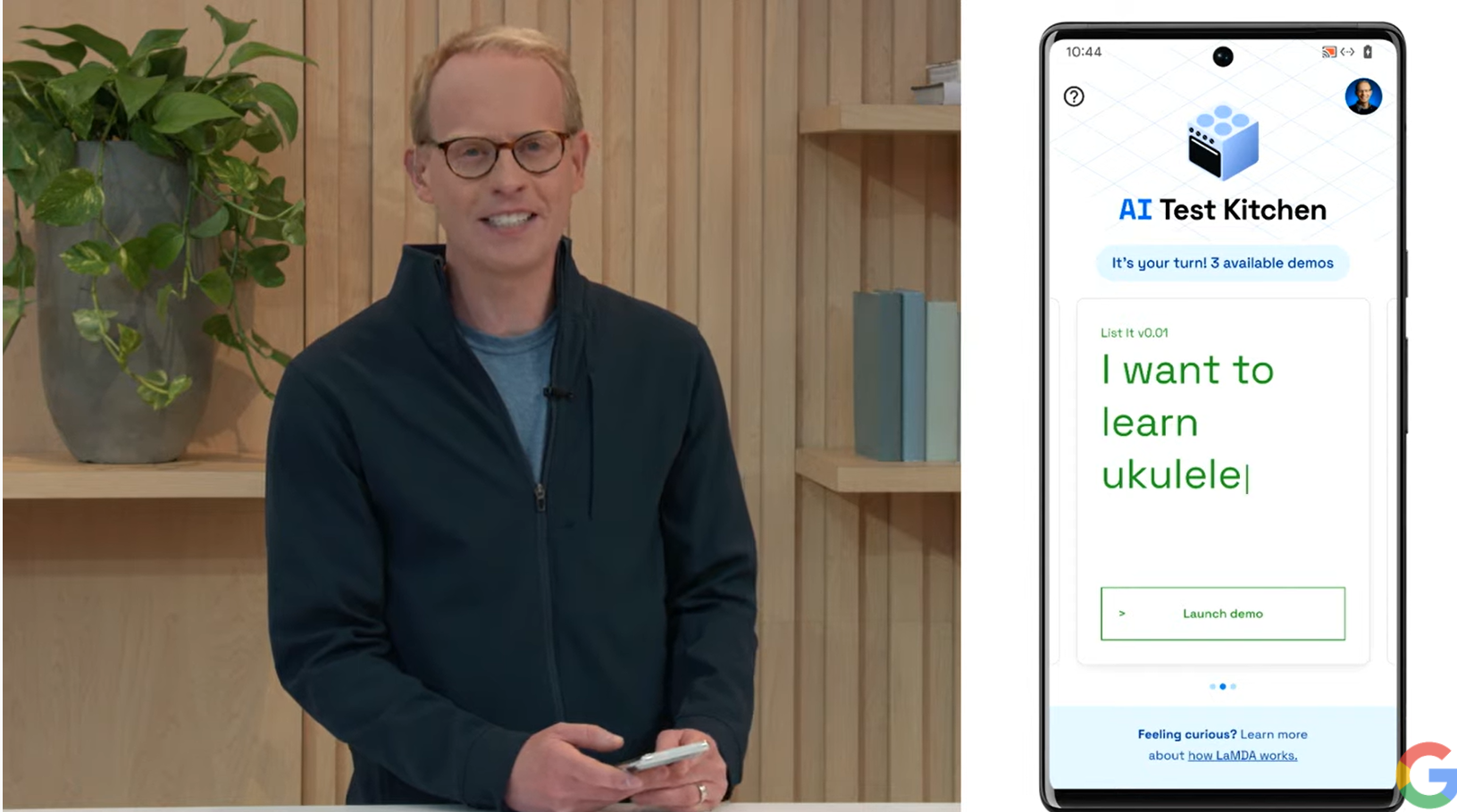
There's a lot of chat in the TechRadar Slack about how this could break the Turing Test - being able to pretend that you're talking to a human rather than a machine.
Get ready for a live test with Josh - he looks happy to be demo'ing this on stage.
Let's see how this goes... I reckon it'll be fine.
In the AI Kitchen, we're in an app called List It, to see if it needs complex tasks broken down.
He's telling it what he wants to do - plant a garden. Lamda has broken it down into tasks like watering, planning what to grow etc.
You can then drop into one of them and will give further suggestions on what you need to do - and what you might need to plant.
And from the lists, you can generate a tip - things like what vegetables to grow in a small yard.
Shockingly this worked perfectly. Almost like it was planned.
I wanted Josh to fail and now I feel bad for Josh. I'm sorry Josh.
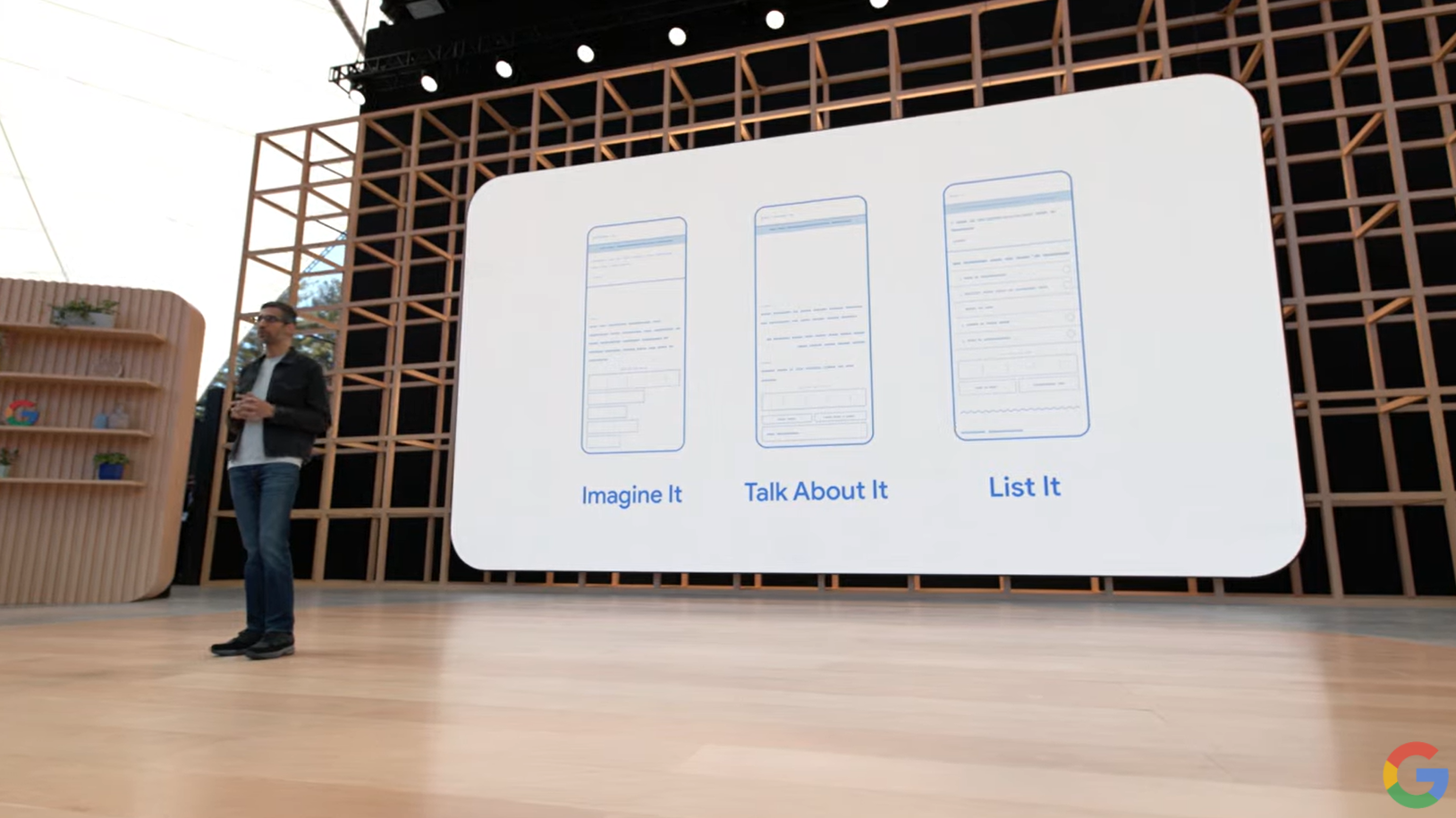
The access will be carefully opened up in the coming months to get it right, with AI scientists and human rights experts to make sure it's safe and useful.
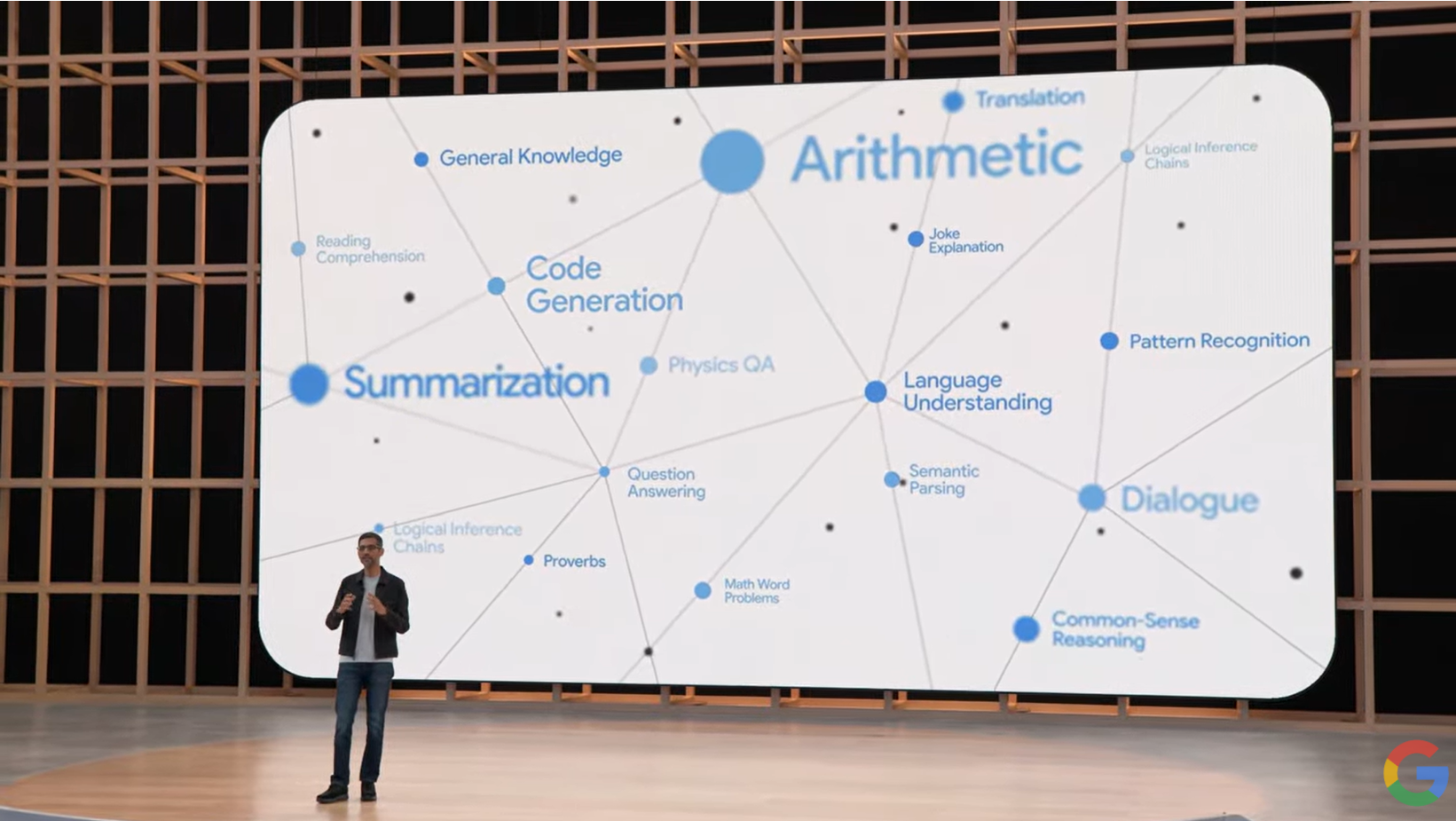
Now we're hearing about Chain-of-Thought Prompting - I won't lie, I'm starting to get too deep.
The idea being that the model can be trained to see how things are worked out, so it can improve its reasoning on things like math problems, using the new PaLM technology.
You can also use this to help get underrepresented languages online - you can prompt the model in English and Bengali, and that will allow it to understand the context between the two.
But it's never seen parallel sentences between the two languages, but has learned how to connect the two naturally.
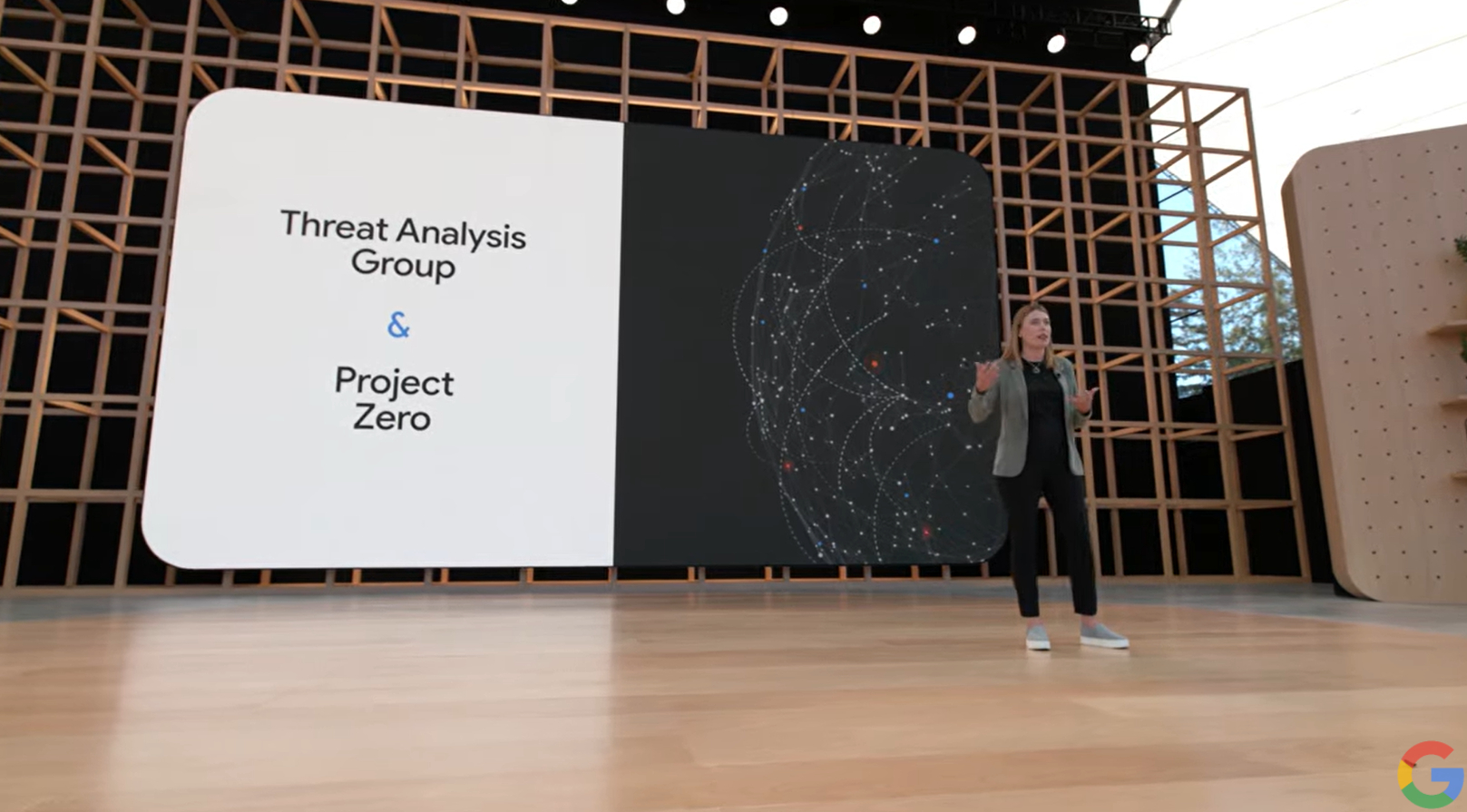
Now we're hearing about Google Tensor, with better AI capabilities - yes, we know it's on the Pixel 6.
We're seeing Jen Fitzpatrick now, an engineer at Google. The goal here is to tell us about how secure and safe and just wonderful Google is.
Although Jen does look really worried about cybersecurity, alerting people to vulnerabilities in their systems with threat analysis.
This included government-backed attacks, including DDoS attacks on Ukrainian websites that were giving information on what's happening with the war, and Google is investing $10bn dollars to improve cybersecurity across the web.
This includes aiming to stop phishing attacks at source, with Gmail and Messages getting rid of them, Google Play scanning the apps and Chrome has inbuilt risky-site protections.
Two Step Verification is being turned on by default to more and more people - and Sign In with Google - this is pretty known stuff.
As Daryl Baxter just said in our chat - 'This time last year, we'd seen Android 12'. Google is going a long way to talk about security and getting rid of passwords instead.
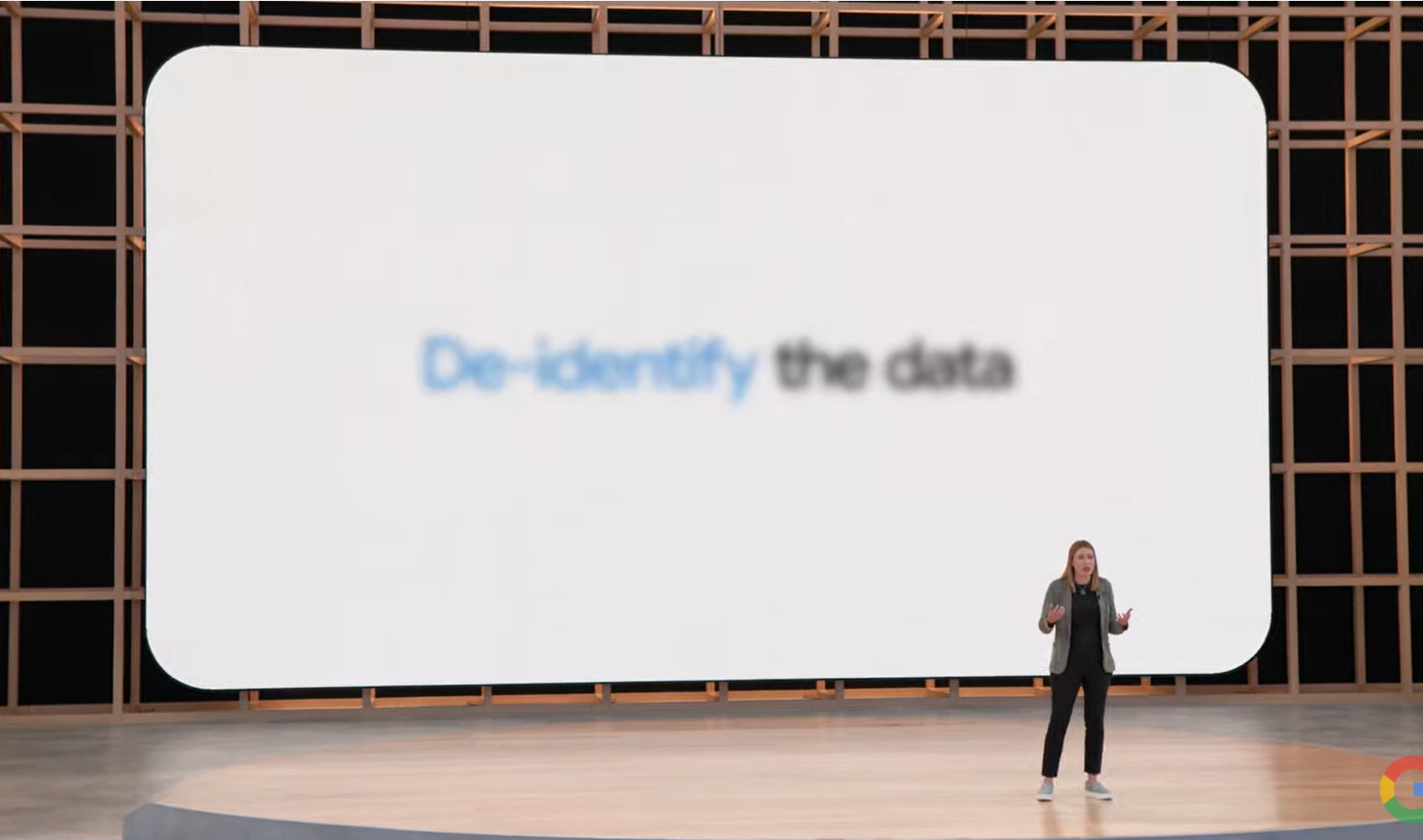
This is getting hard to follow - there's a lot here today, folks. Google is adding in virtual credit cards, and protecting your computing.
Google is trying to minimize the data online, and trying to de-identify the data so it's no longer linked. And then restricting access - to Google too - allowing users to be less hackable online. But will it be less trackable?
Right, let's hear about privacy a little more - first question 'Have you ever searched for yourself?'
Why yes, yes I have.
If you find search results that show your phone, email or similar, you can request their removal. This was shown off a couple of weeks ago, but it will be available in the Google app in the coming months.
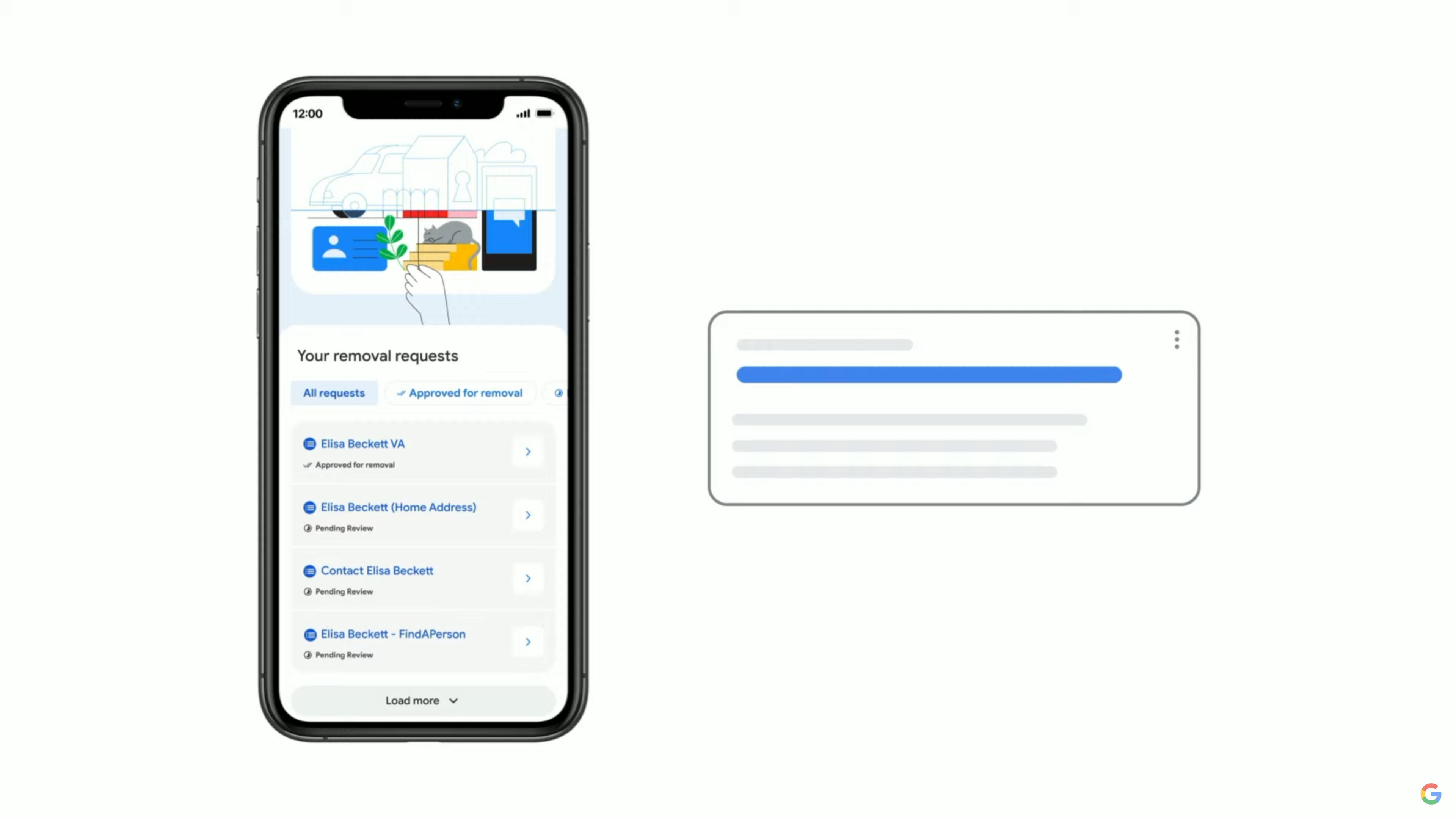
This is a really dry IO so far. We're hearing that 1.6bn have used 'About this result' recently, and the new upgrade will tell you whether the site you're on is reputable.
That's coming to the Google App on iOS and Android. That got a clap.
Right, I think it's time to talk Android.
It is! Finally.
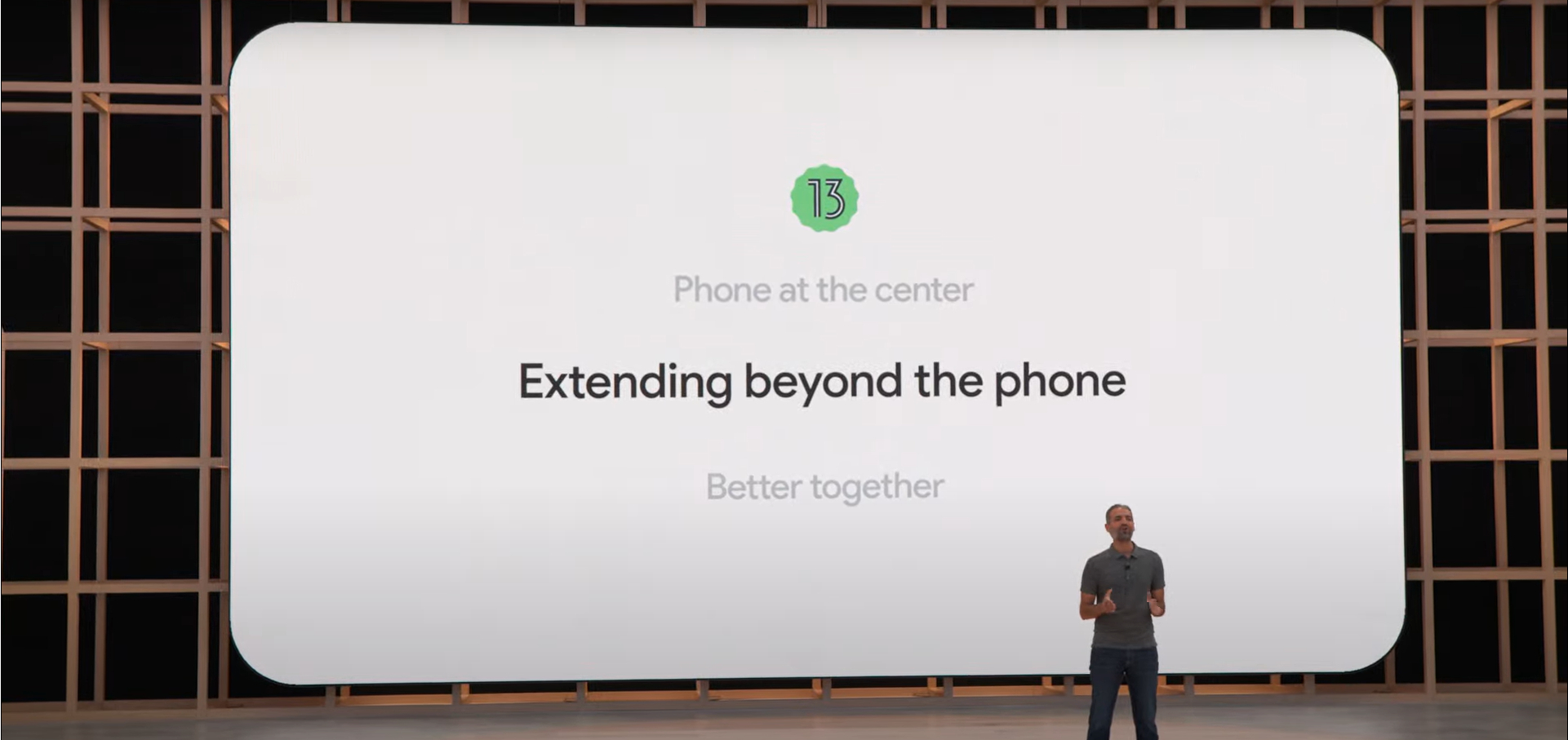
One billion new phones activated in the last year, and with more machine learning they can help us 'get more done than ever before'.
I don't think that's true about every Android device, but good to try and tell us that.
It's not just phones - we're seeing cars, tablets and smartphones in the background.
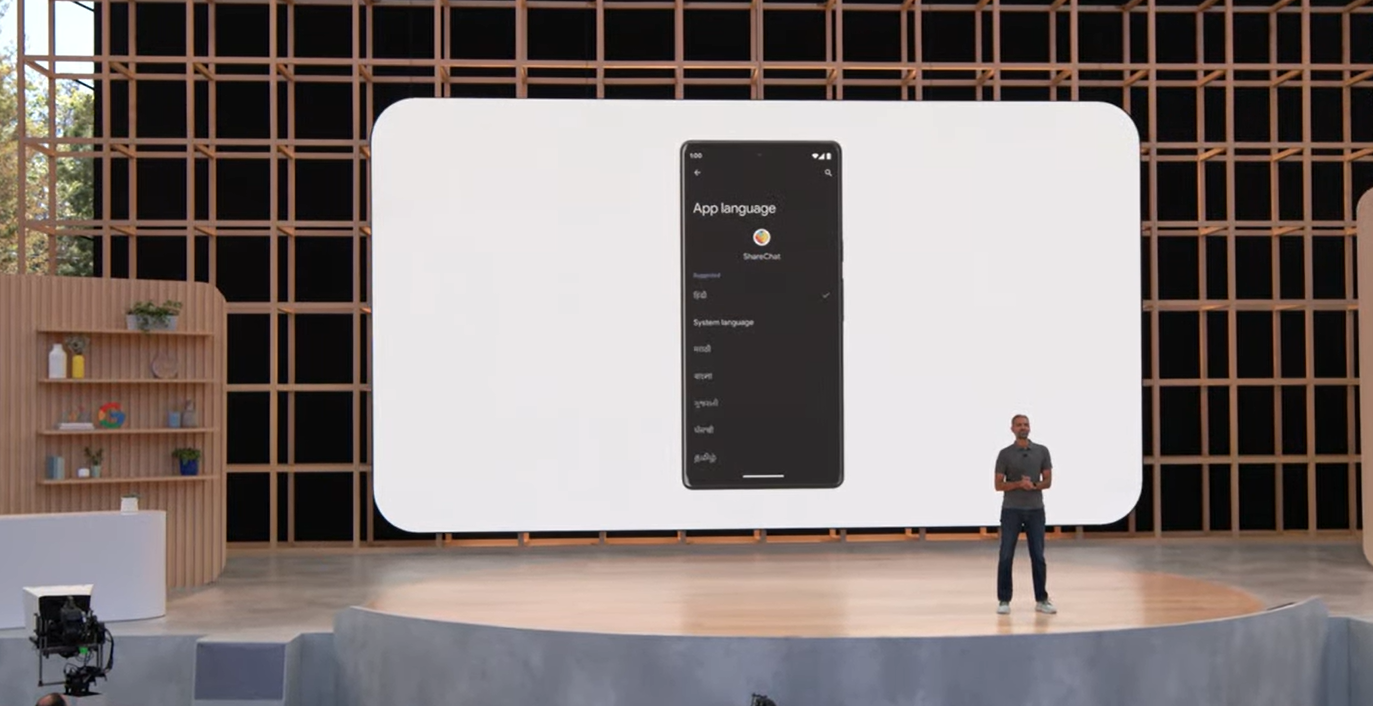
But we are talking about phones first - with the new Material Design language. And more apps can use your color theme, and the media player will reflect the music playing, with the progress bar moving to the beat of the tunes.
Android 13 is 'jam-packed' with security features too - and you can have different languages for different apps, which is cool.
Messages packing RCS is coming properly within Android, and there was a thinly-veiled jab at Apple to upgrade too - meaning that it's a private message between both platforms.
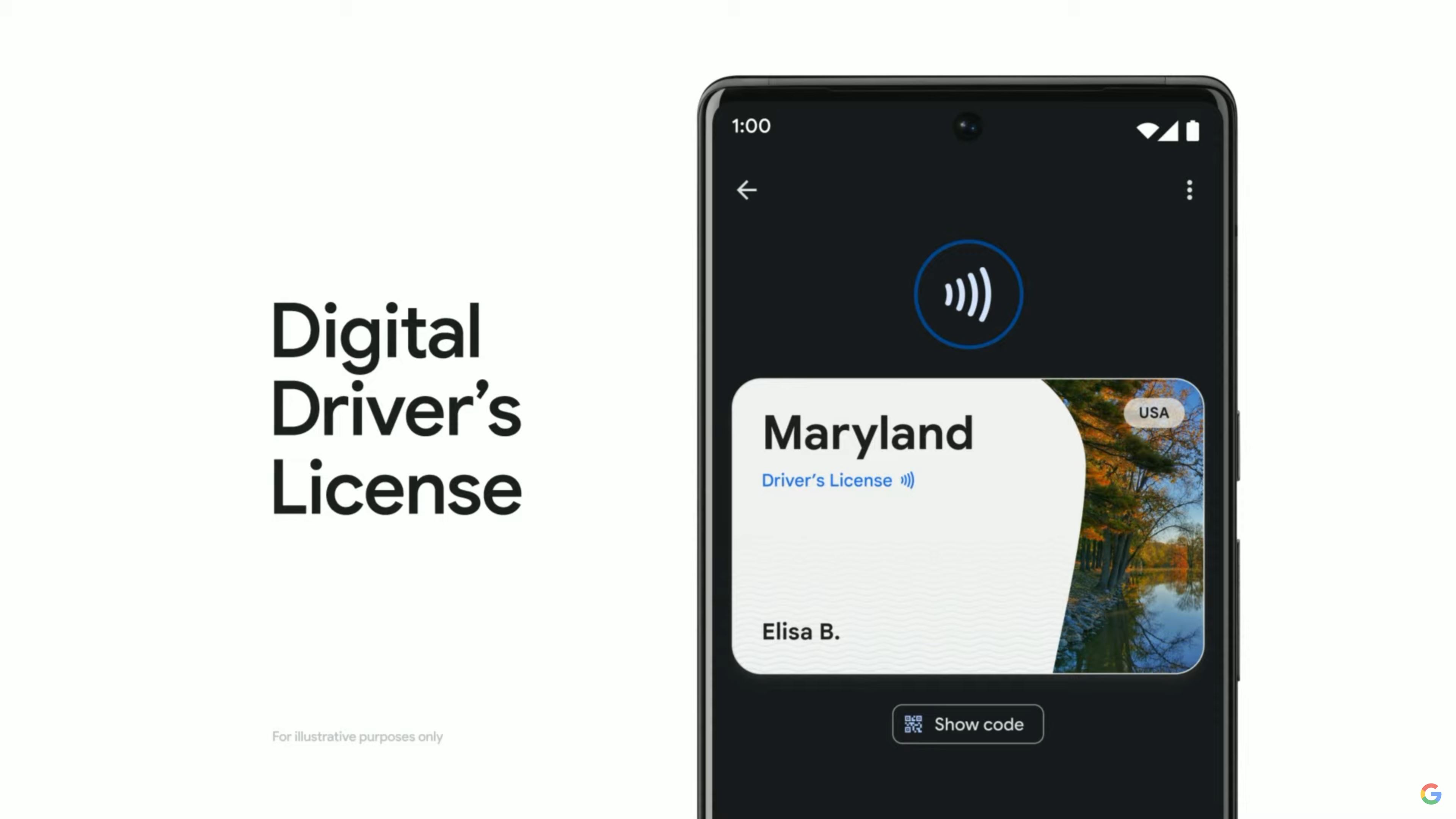
There's a new Google wallet - a digital wallet for Android that offers you secure storage for payment cards, but also vaccine records, gym memberships, board a flight, start a car, or plug in your Walt Disney Pass.
This is Apple Wallet on Google phones. "This is Google Google Wallet, but it feels like a rebrand of Google Pay - it does all the things listed already, says Phones Editor Tom Bedford.
And Digital IDs are coming to Wallet later this year, starting with drivers' licenses. That's coming to Android and WearOS in the coming weeks.
It'll also offer accident detection for phones and wearables, allowing you to contact the emergency services.
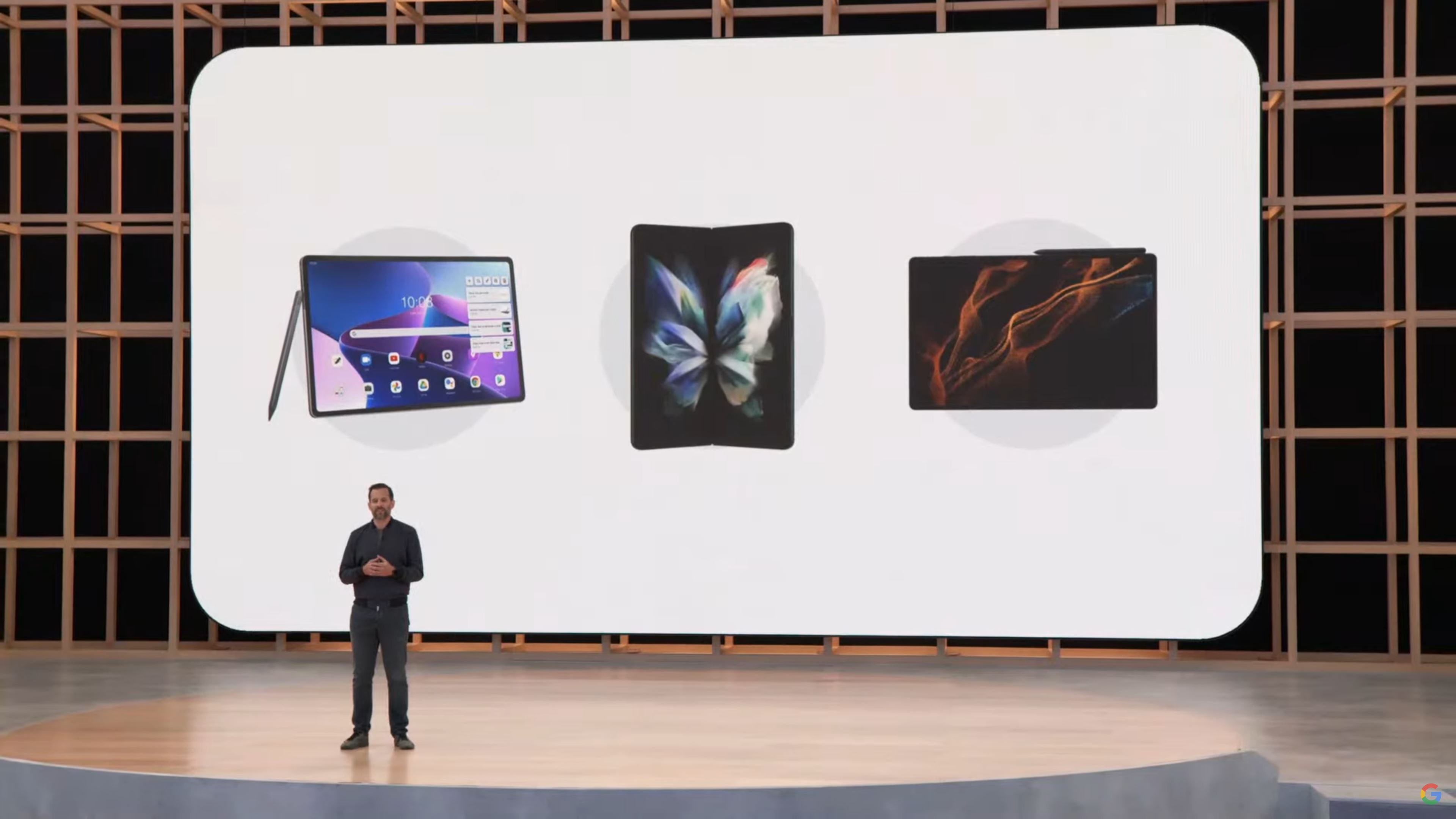
We're onto WearOS - since the announcement with Samsung last year, there's been a tripling of the WearOS product range since last year, and more apps are coming - Adidas Running and Line, for instance.
Samsung, Xiaomi and Lenovo are also bringing the tablet experience on a large-screen device - as well as foldables. But Google has 'been working to make the tablet experience amazing' - and boy, does it need to.
This just feels like the larger Android UI that tablets have always had - let's see how it goes.

There are a lot of similar experiences to iPadOS, with split view, the task bar at the bottom, and 20-plus Google apps will be updated to work better on tablets.
Third party apps are upgraded too - with TikTok, Zoom and Facebook all getting the new look.
Google Play is getting a new UI that makes more of the larger screen, and Google is 'working hard' to making the discovery of the apps in Play that much easier.
It doesn't say how though.
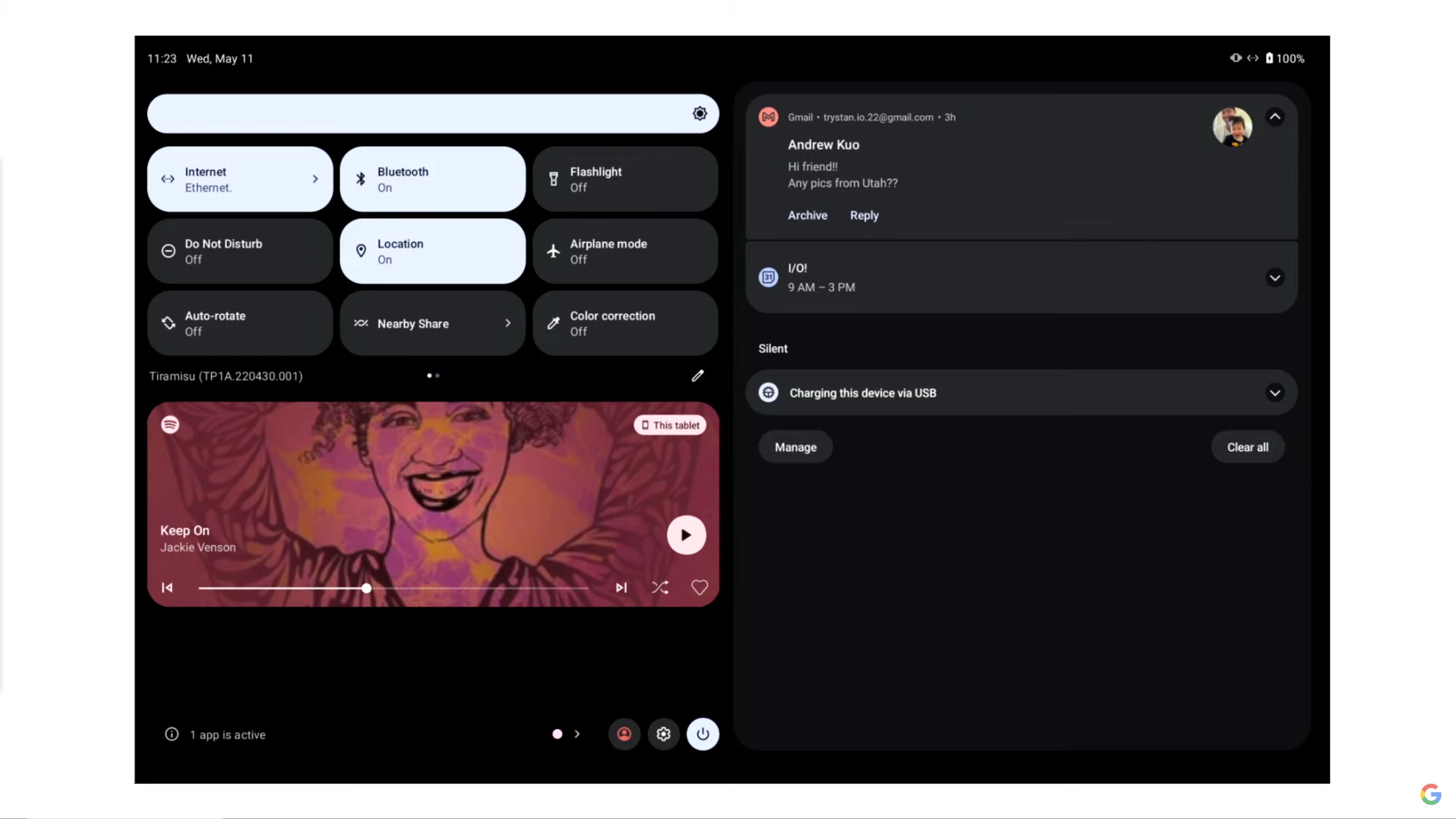
We're now onto how Casting capabilities, where you can pass stuff from your phone to your car, Chromebook or speaker with a single tap.
The same with Messages, where you can access all the phone's messaging apps on the Chromebook by streaming it from the device, rather than needing to install an app.
It basically allows the Chromebook to be a large remote for your phone - this feels like tech that should have been around ages ago though, it's hardly ground-breaking.
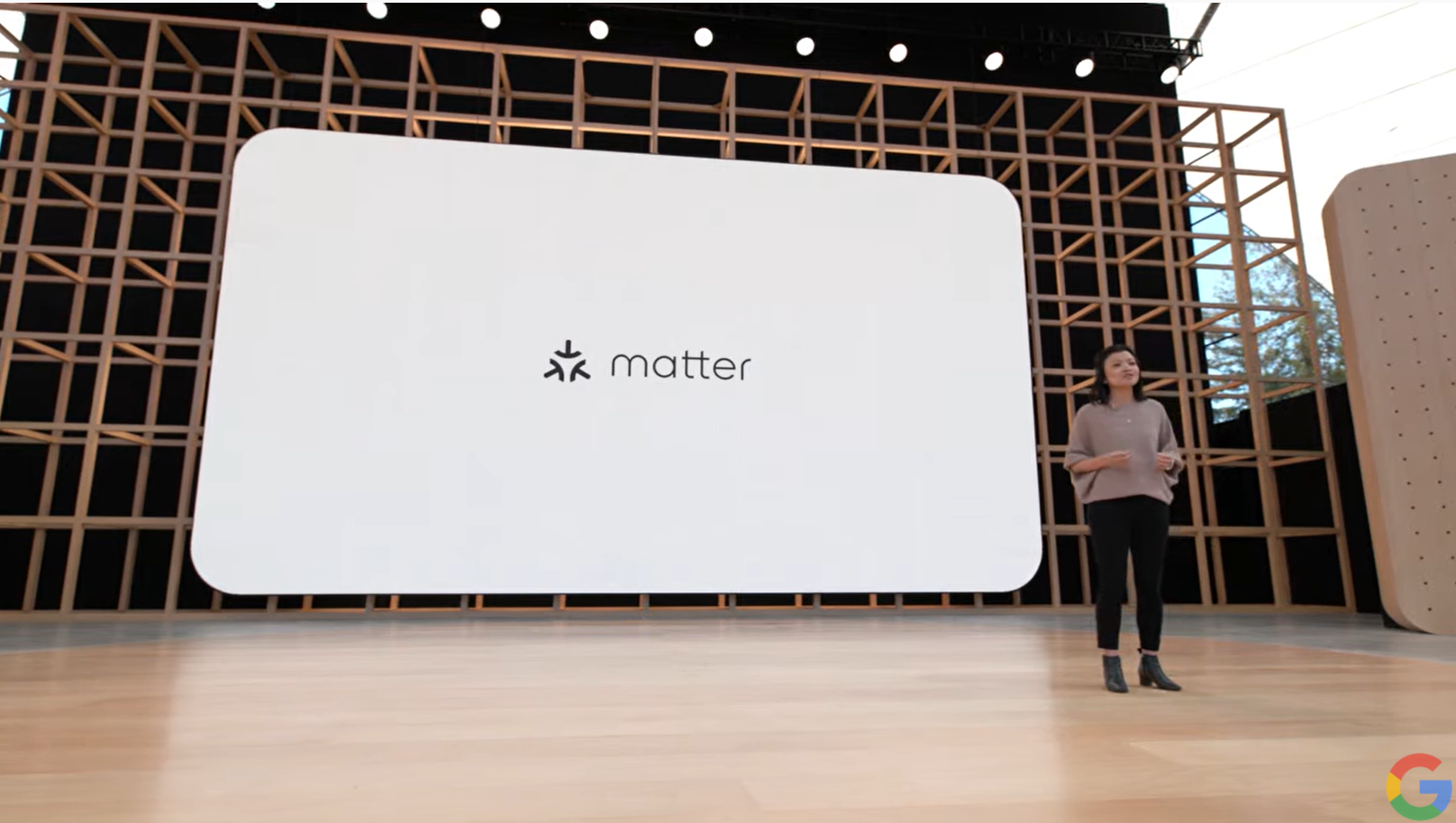
Here's Fast Pair - again, this is something that's being nabbed from Apple, so your TV, laptop or others connect to smart devices or headphones.
Oh, here comes Matter. This is BIG NEWS. This is the smart home language that all the big brands have signed up to, so it should (maybe) mean the end of terrible, fragmented smart home issues.
Oh... that was it. 'Matter is coming this Fall'. Great, we knew that.
Android 13 Beta is launching today.
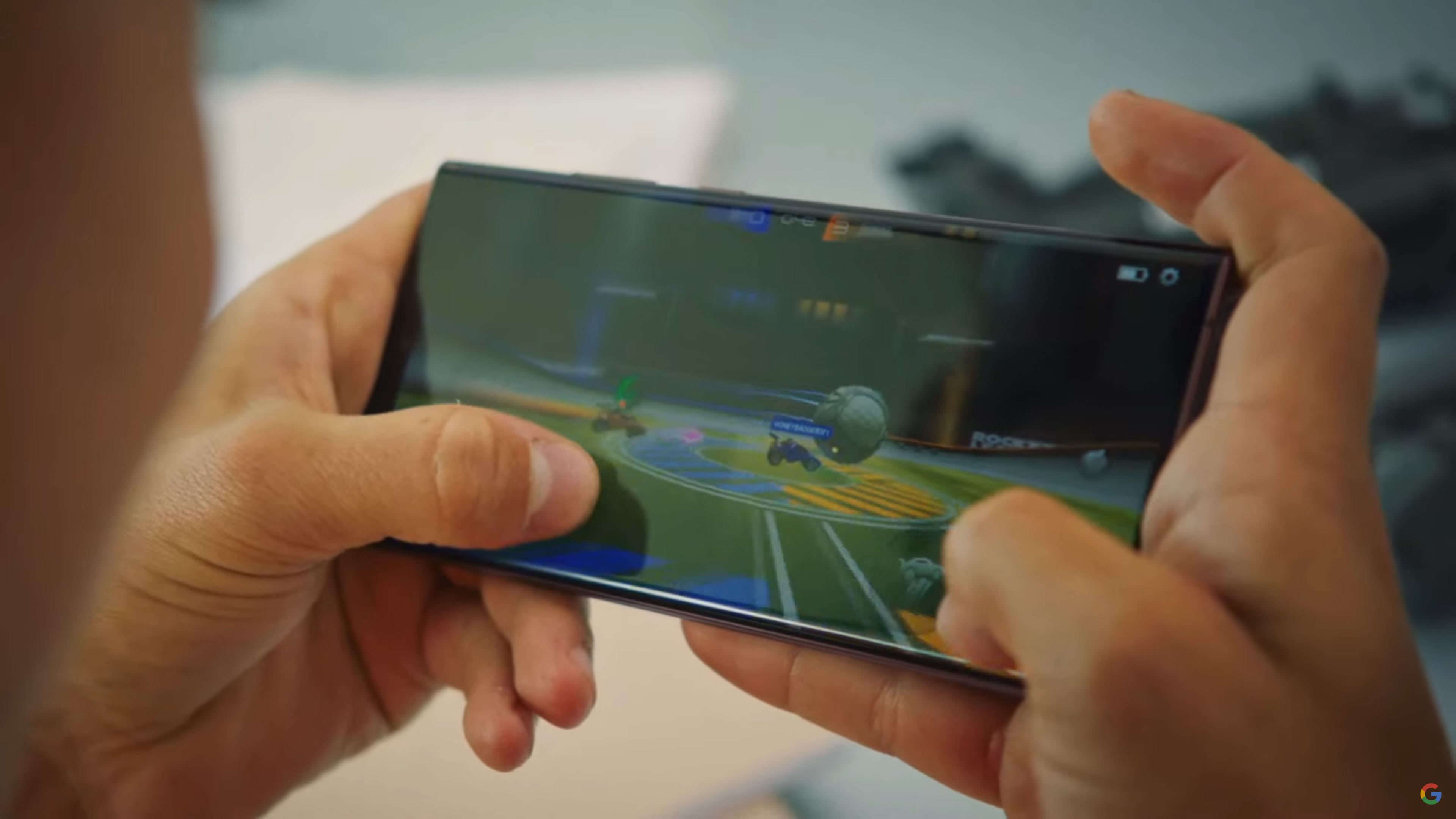
Let's go and see the next 'Fast Pair' of F1 McLaren's Lando Norris and Daniel Ricciardo. That was quite a good joke.
Daniel has a massive tablet and is trying to play a game and Lando has a phone. That's easier.
In fairness, these two are pretty camera-friendly and natural.
Imagine if there was no hardware today. Imagine.
No, don't imagine Gareth. That would mean today has been building to nothing.
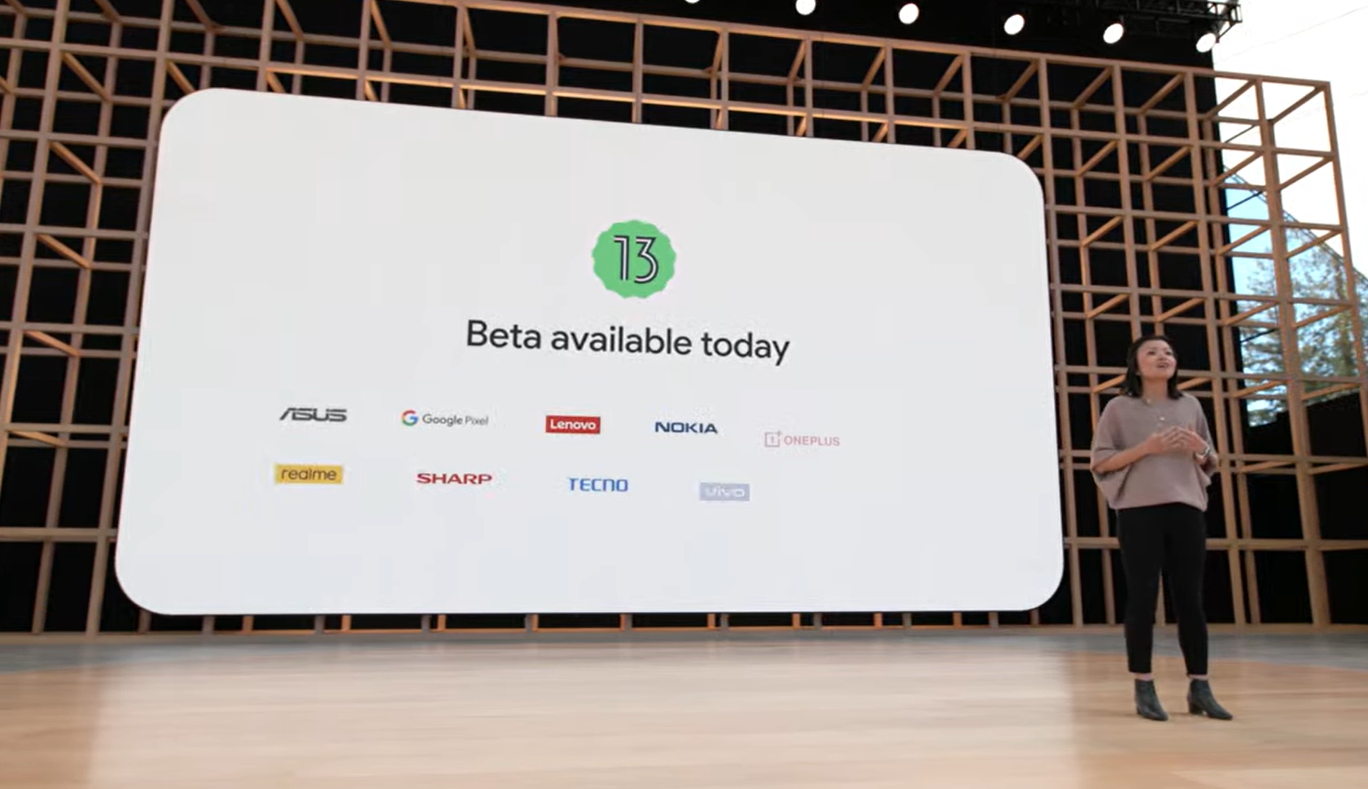
Oh wait - as if by magic, we're now talking about hardware. Pixel 6 is up first, recapping how it appeared last year with the new Tensor chip and new camera tech.
We know this... are you building to the Pixel 6a, Google? Yes, we know that it sold quickly (and it sold more than Pixel 4 and 5 combined).
Yes, Pixel 6a. Here it is.
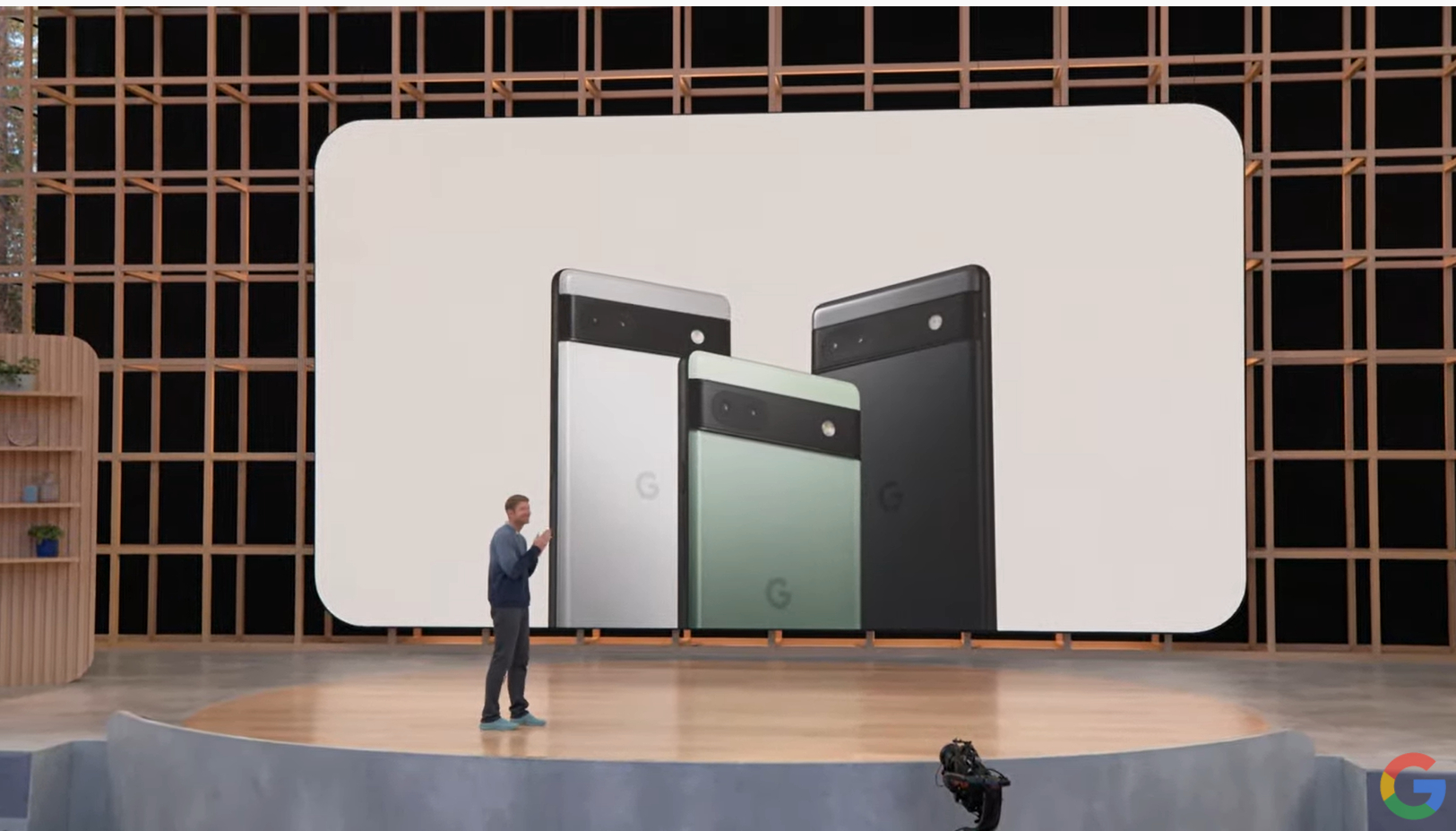
Starting at $449 as usual, it looks similar to the Pixel 6 two-tone, with the camera bar and a dual-camera with a dual 12MP wide-angle and regular camera.
Previously, the 'A-series' took the best in Google's processing and kept the price down. But the Pixel 6a will use the Tensor chipset, meaning that the new phone will have 5G connection, uses the same security architecture and has the same power as the Pixel 6 Pro.
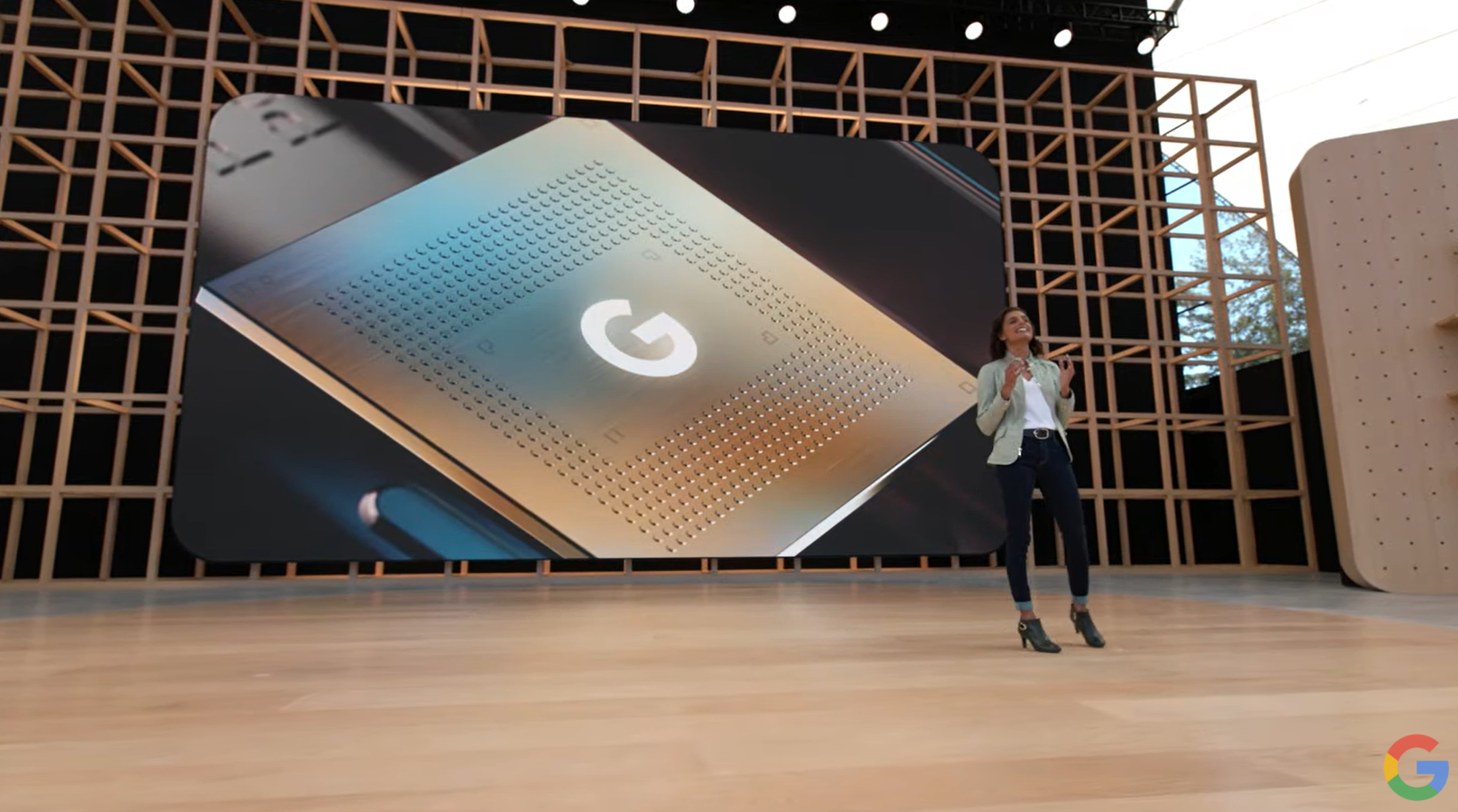
Now onto photography - with Real Tone for skin-based picture, and Magic Eraser to get rid of things in the background, as well as Night Sight for darker scenes.
Eraser has been improved so you can change the color of objects too, so you can make them less distracting.
On device processing for Live Translate is being told again, with Interpreter Mode, so people can bust through language barriers.
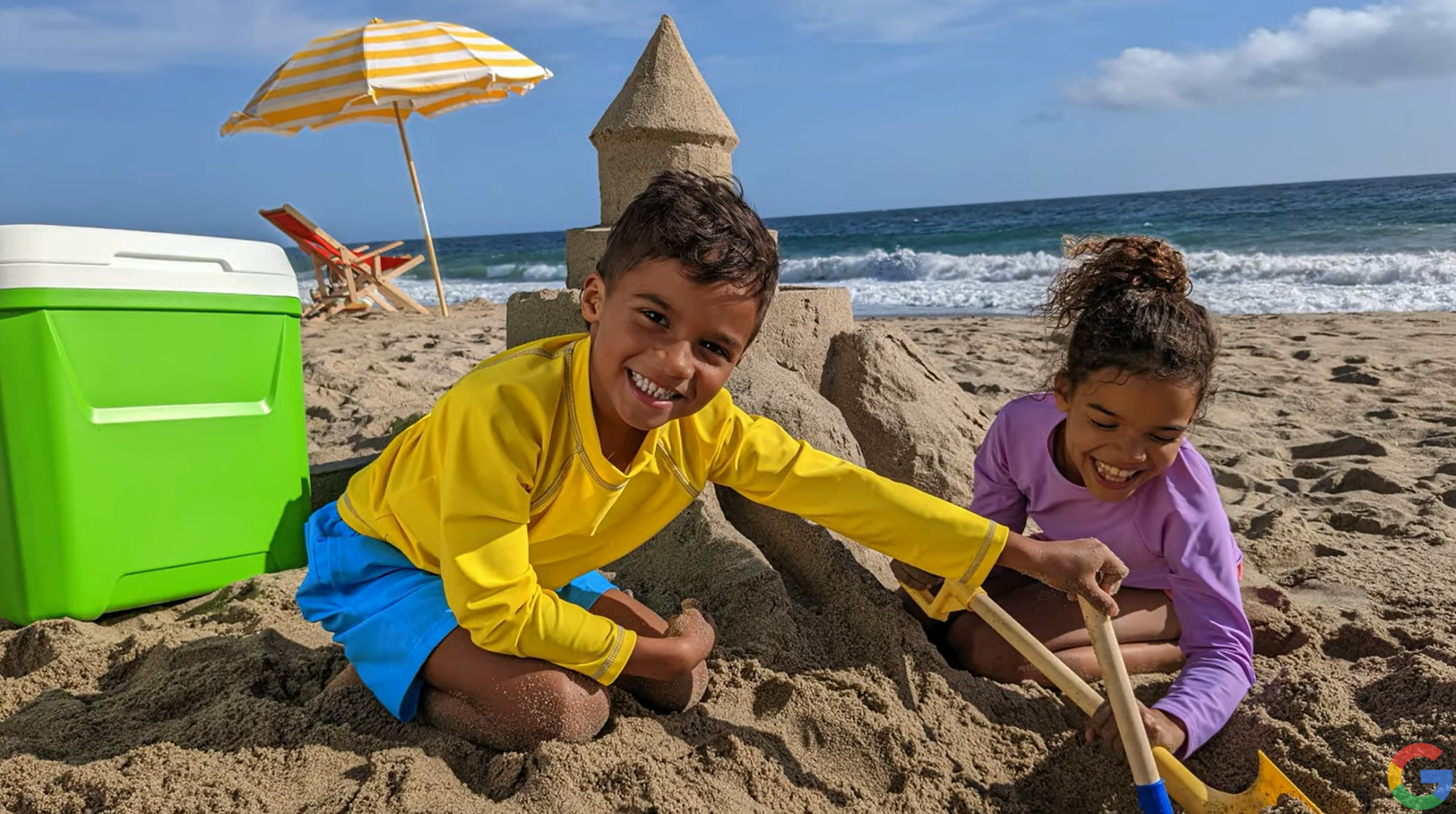
Pre-order starts on July 21, and comes in three colors - black, white and pastel green (I'm not sure on the odd Google names).
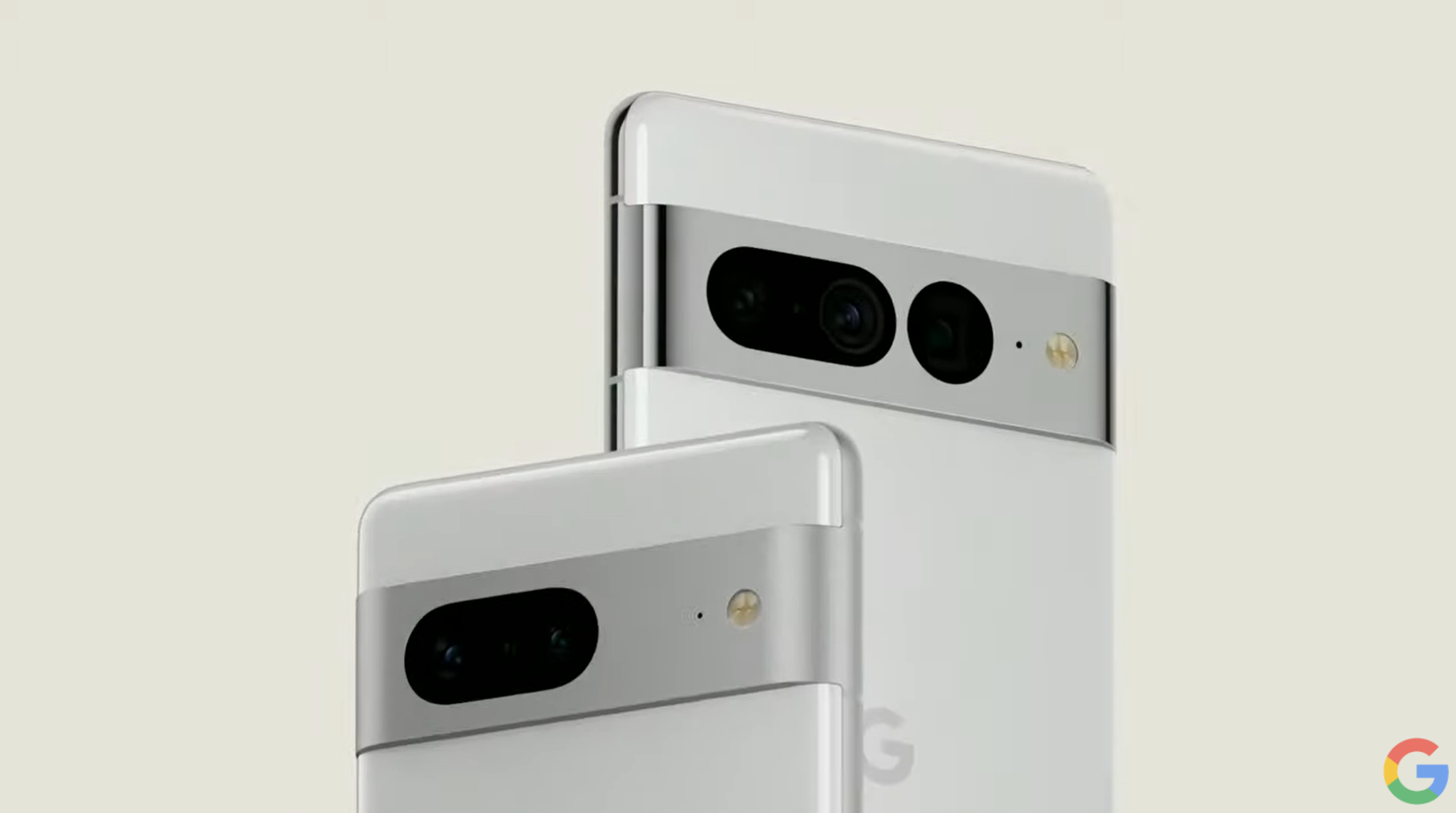
Oh wait - there's a preview of the Pixel 7 phones coming! That's surprising. There are images and everything for a phone coming this Fall.
The aluminum finish is coming to the camera bar, with a single piece of metal, and the Pixel 7 Pro will have a triple camera on the rear.
Inside, they'll use the next generation of the Google Tensor chipset, and will ship with Android 13.
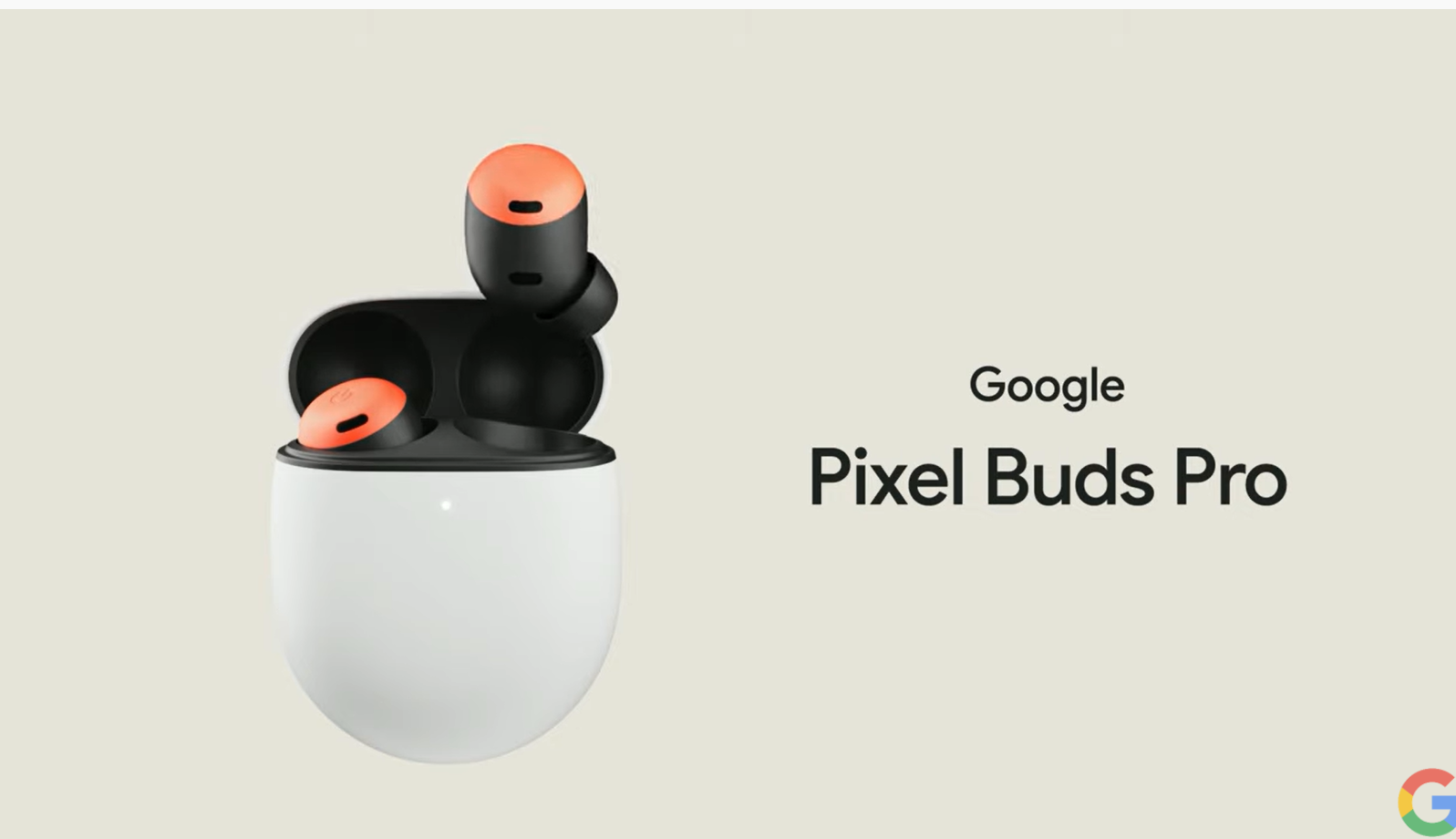
Next up - Pixel Buds. Someone just screamed 'PIXEL BUDS!'
Oh - this is also surprising - the Pixel Buds Pro are coming in now. I did not see that coming.
Becky Scarrott, our Senior Audio Writer, was right - they do come with active noise cancelling, and they're smaller, silicon-based buds too.
They've got a neural processing engine - and because people can't always make a perfect seal, so the buds will spot any leaking sound and cancel it too.
There's also transparency mode, to hear things outside coming in - with beam-forming microphones to suppress wind, traffic and other noise.
There's a custom audio chip, with 11 hours' listening (another one Becky called) and you can use them to ask Google Assistant any time, and will allow them to switch between a video call on the laptop and your podcast on a phone.
They'll also support Spatial Audio (man, Becky is good) for other apps that support it. They come in fouir colors for $199 from July 21 - with red, cream, black and white all offered.
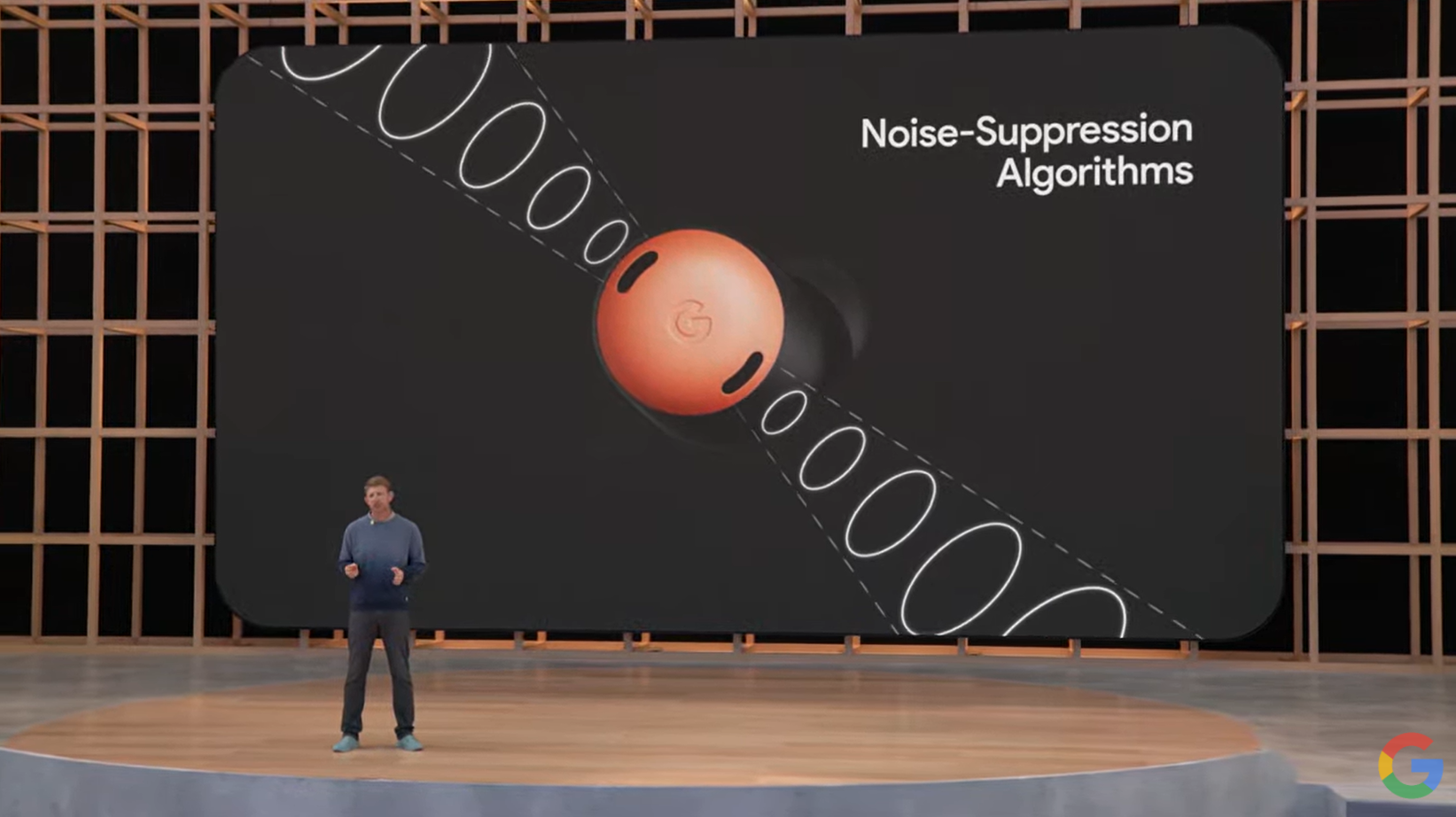
My God, this is a long conference. I can't believe it's already 100 minutes plus. My fingers hurt.
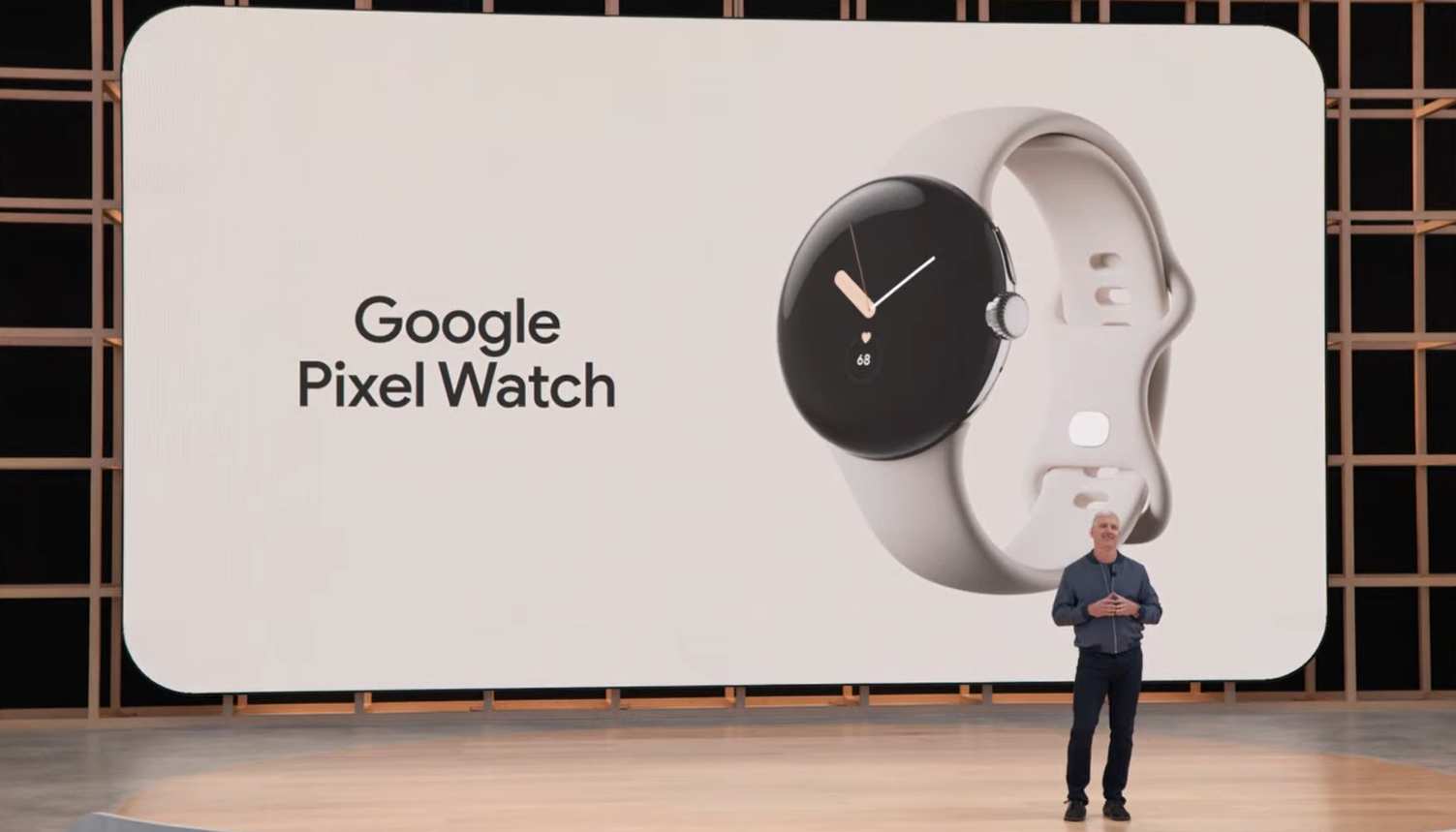
OK, now we're going to see what's coming. A preview of the new Pixel Watch - the first built by Google, and it's coming with the Pixel 7 this Fall.
There's the domed design, a crown and customisable bands that attach easily, and offers the best of WearOS with a new user interface, and designed to be voice-, tap- and glance-friendly.
That's kind of a given, right?
You can get directions on the go without a phone, and can drop the wallet - but I'm not sure if this is cellular-enabled, or it's stored on device.
You can connect to Google's Home system, and it's also deeply integrated with Fitbit.
That's coming first to the Pixel Watch for 'industry-leading' insights. Active Zone minutes, track steps, see your insights and always-on heart rate measurements.
Yeah, not sure about that - brands like Garmin can already do that - what's going to be different?
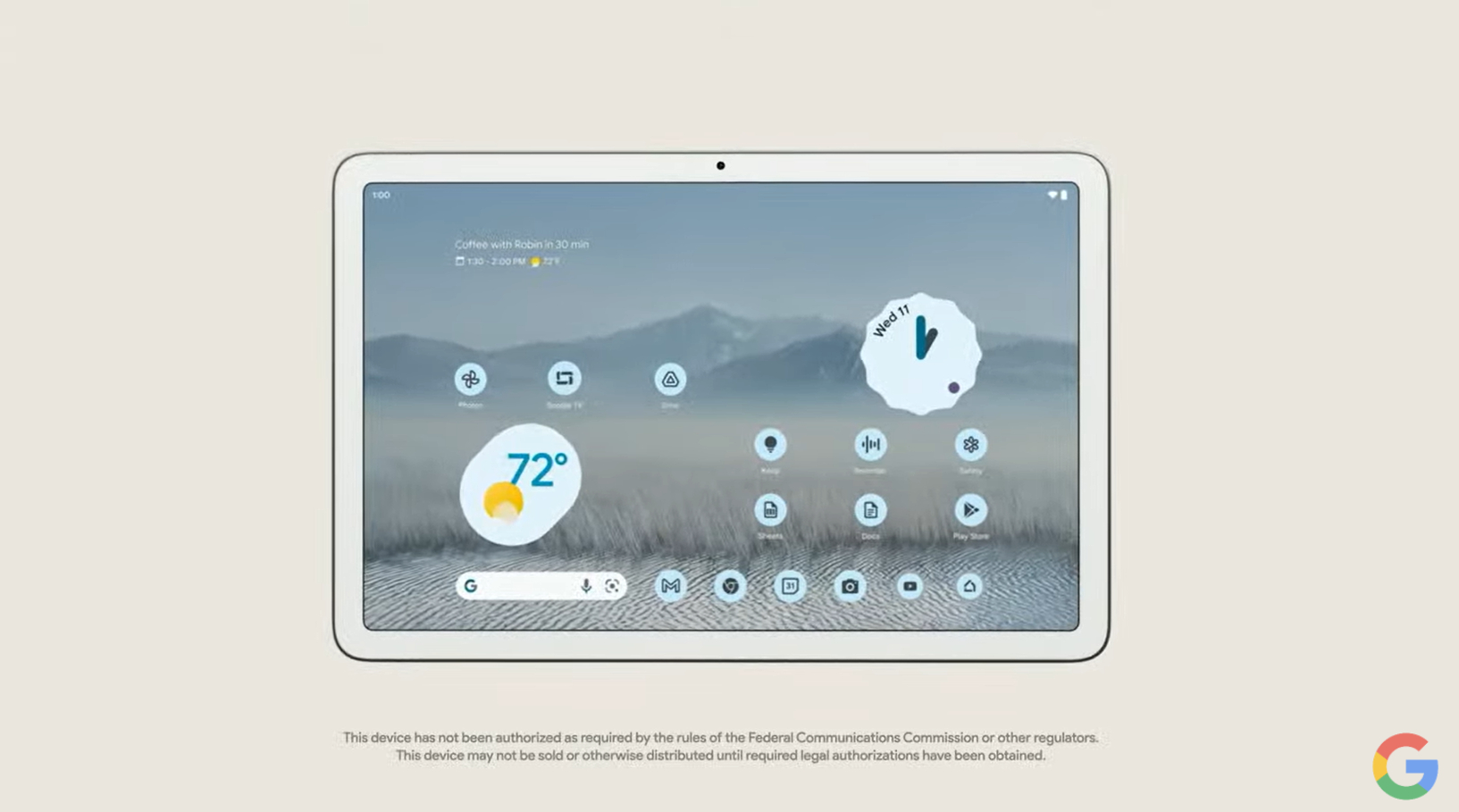
Right, we're hearing about the Pixel Tablet, coming in 2023, and it's just a small preview. But it looks larger and clearer than many new Android tablets on the market - let's see what happens with this one.
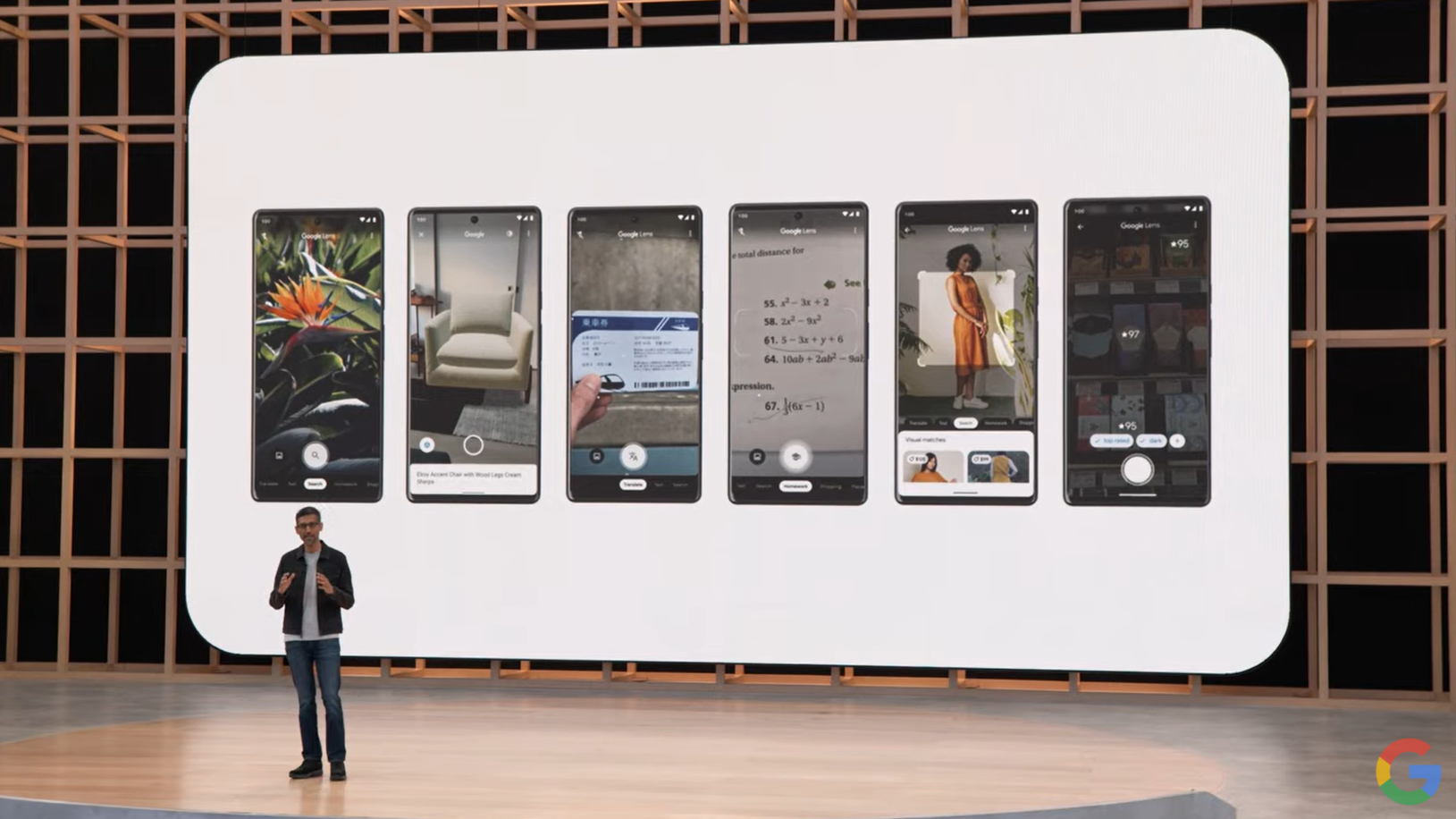
Google clearly doesn't want us to sleep tonight - this is a lot to sift through. There's:
- Google Pixel 6a
- Google Pixel 7
- Google Pixel 7 Pro
- Google Pixel Buds Pro
- Google Pixel Watch
- Google Pixel Tablet
Remember when I said that there might not be any hardware? I'm not crying. I promise.

I can't tell if Sundar Pichai being on stage means that we're wrapping up, or this is just the second act.
We're watching a video of Google showing the next... NO, NOT NEW GOOGLE GLASS.
WHY GOOGLE, WHY?
It's the first smart glass prototypes that look normal - they're translating on the go, showing you key information and not making it look like you're wearing a VR headset.
"That's ridiculous - So many accessibiity wins there" says Daryl.

OK, those look like prototypes, as there's very little else about them on stage - but that's massive. Easily the star of the show, even if they're years away.
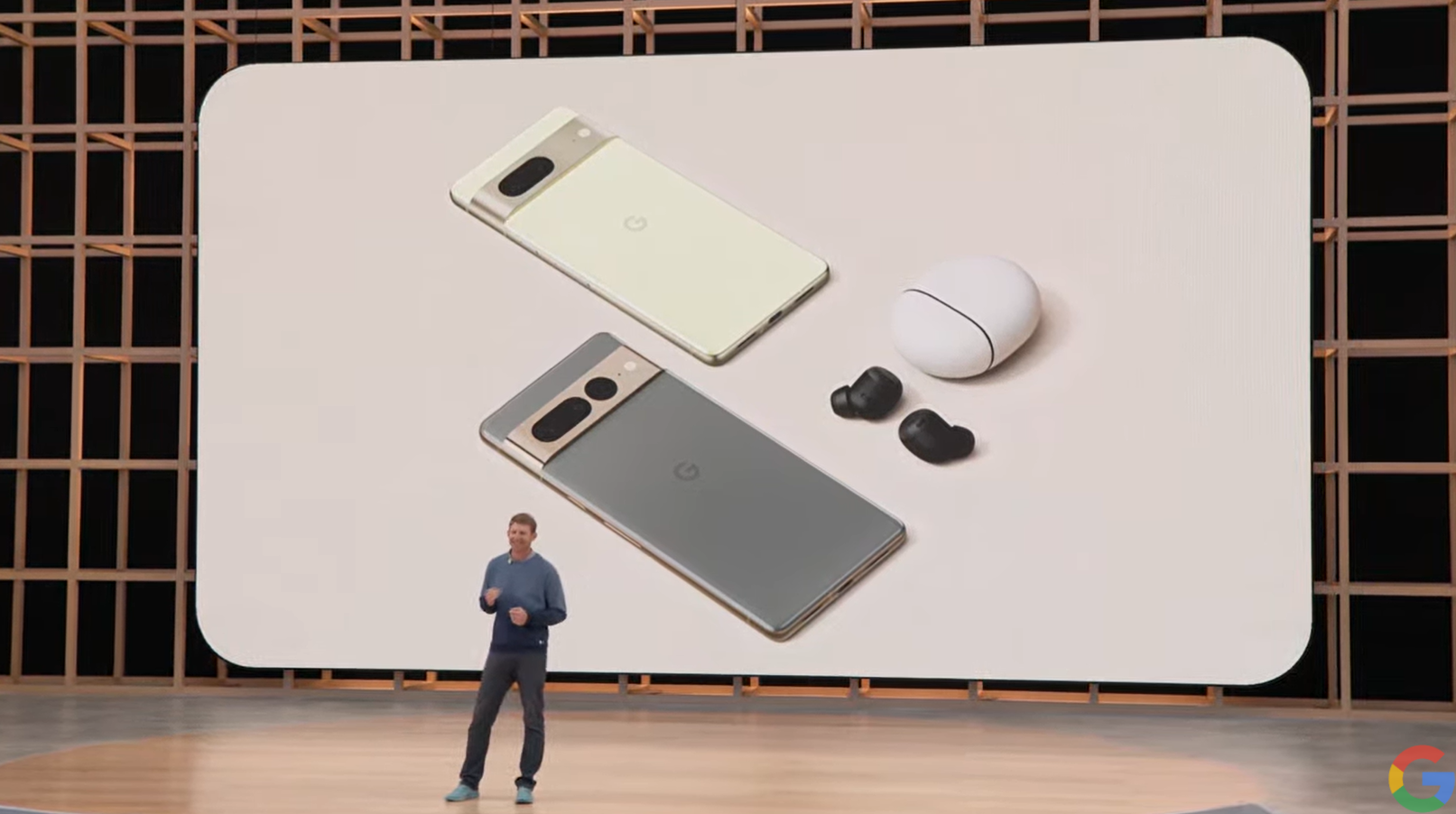
OK, we're definitely done now - thank you so much for following along with this epic conference, which started so slowly and ended with a buzzer-beater of a reveal.
Stay tuned to all the impending coverage on TechRadar - I get the feeling we've got a lot to talk about...

This is something that's probably not going to get a lot of attention at the moment, but should: Google has announced Health Connect, a new API that's going to allow your health data to be shared more easily between apps.
Right now, it's a bit of a tricky thing to pass data across, but Health Connect allows you to suck all key information (like activity, sleep, nutrition, body measurements and vitals) and place it in one storage spot on the phone.
From there, and with 'granular' permission, apps can then read said data and give you a more full-bodied experience - apps like MyFitnessPal have already signed up.
Will this be a big deal? Only time will tell, but it will certainly help the likes of Samsung, who collaborated on the new API, take the fight to Apple with its centralized Health app.
Augmented reality can break down communication barriers – and help us better understand each other by making language visible. Watch what happens when we bring technologies like transcription and translation to your line of sight. #GoogleIO ↓ pic.twitter.com/ZLhd4BWPGhMay 11, 2022
If you want to see that full Google Glass prototype video, here it is. I urge you to watch it - it's pretty cool and this could have just changed the game for those thinking that Apple Glasses would come first...
Good morning!
It's a new day but we're still seeing drips of information following on from Google IO. Plus, we've had time to think about (read: get our head around) all the information from the event. So expect lots of coverage through the day which, of course, we'll be sharing here.
For now, we're downloading the new Android 13 Beta, and hope to find some cool new features here.
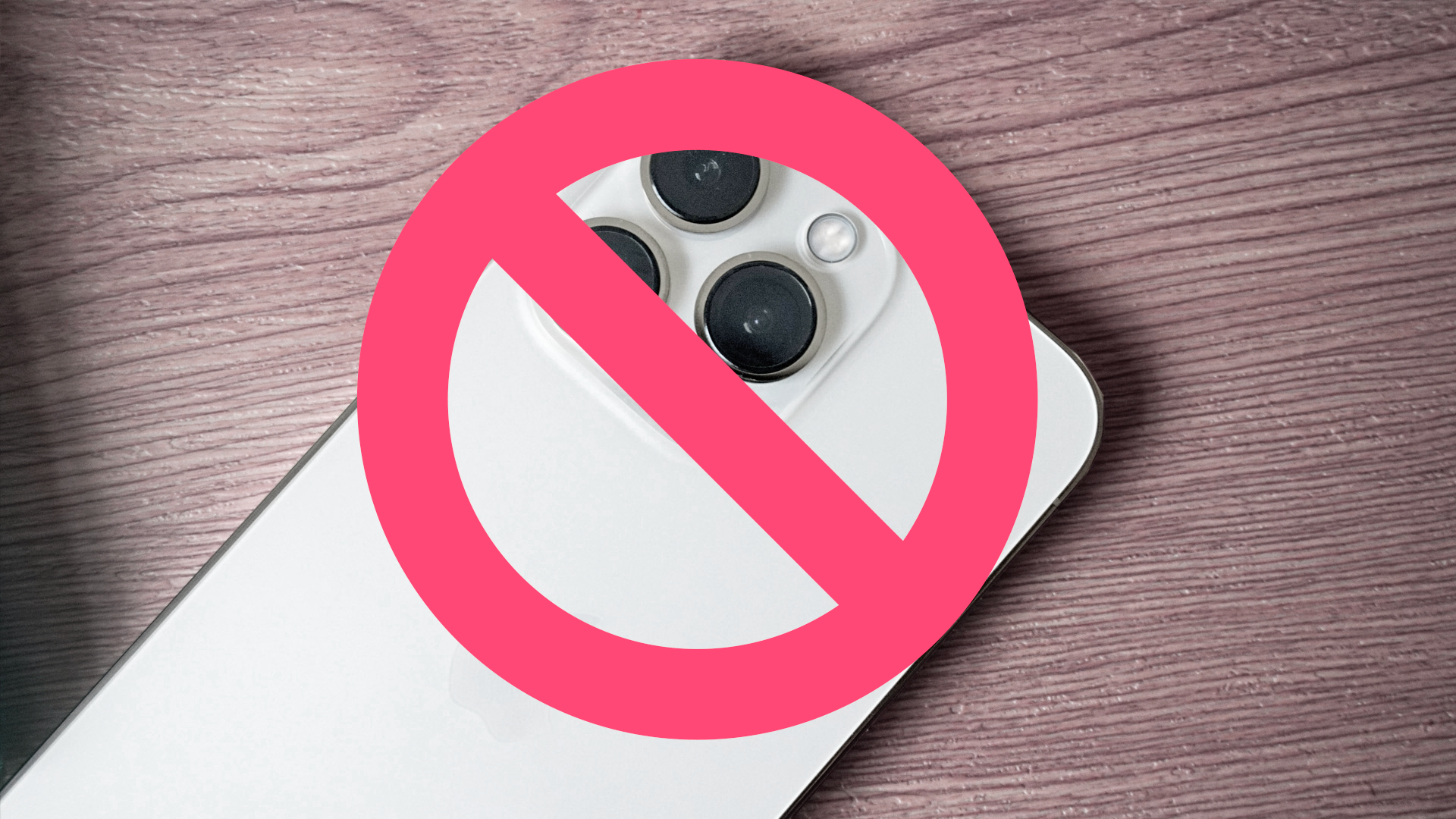
You might not have noticed, but a tiny extra piece of Google Pixel Watch information was shared at Google IO.
That's the fact that the upcoming Wear OS 3 smartwatch won't work with iPhones - sorry, iOS users who want a round wearable, but you can't use this device. That's a surprisingly familiar sentiment to the only other Wear OS 3 watches, the Galaxy Watch 4 line.
Does that mean that no smartwatches running the new Wear OS 3 software will be compatible with iPhones? We can't say for sure, though it's looking very likely.
We've been thinking about Google IO's tablet information - not only was a new Pixel tablet teased, but Google confirmed that Android 13 will bring some huge changes to slate software.
In fact, one of our writers has pledged that this could be the year they give up their iPad Pro in favor of an Android tablet - this is a big claim and we're absolutely going to hold the writer to this.
Their reasoning isn't just about the Google IO announcements, as it touches on other changes in the tablet industry too. Take a read.
Our minds are also on smartphone software, and one writer has pointed out how iOS 16 doesn't have much to worry about from Android 13.
It does seem like Android 13 is quite a minor upgrade, bringing some tweaks to existing features like Material You and Google Pay, without hugely shaking up the way Android phones work.
So when WWDC brings us iOS 16, the ball is totally in Apple's court - maybe it could announce some huge features and turn heads, or bring a smaller update itself.
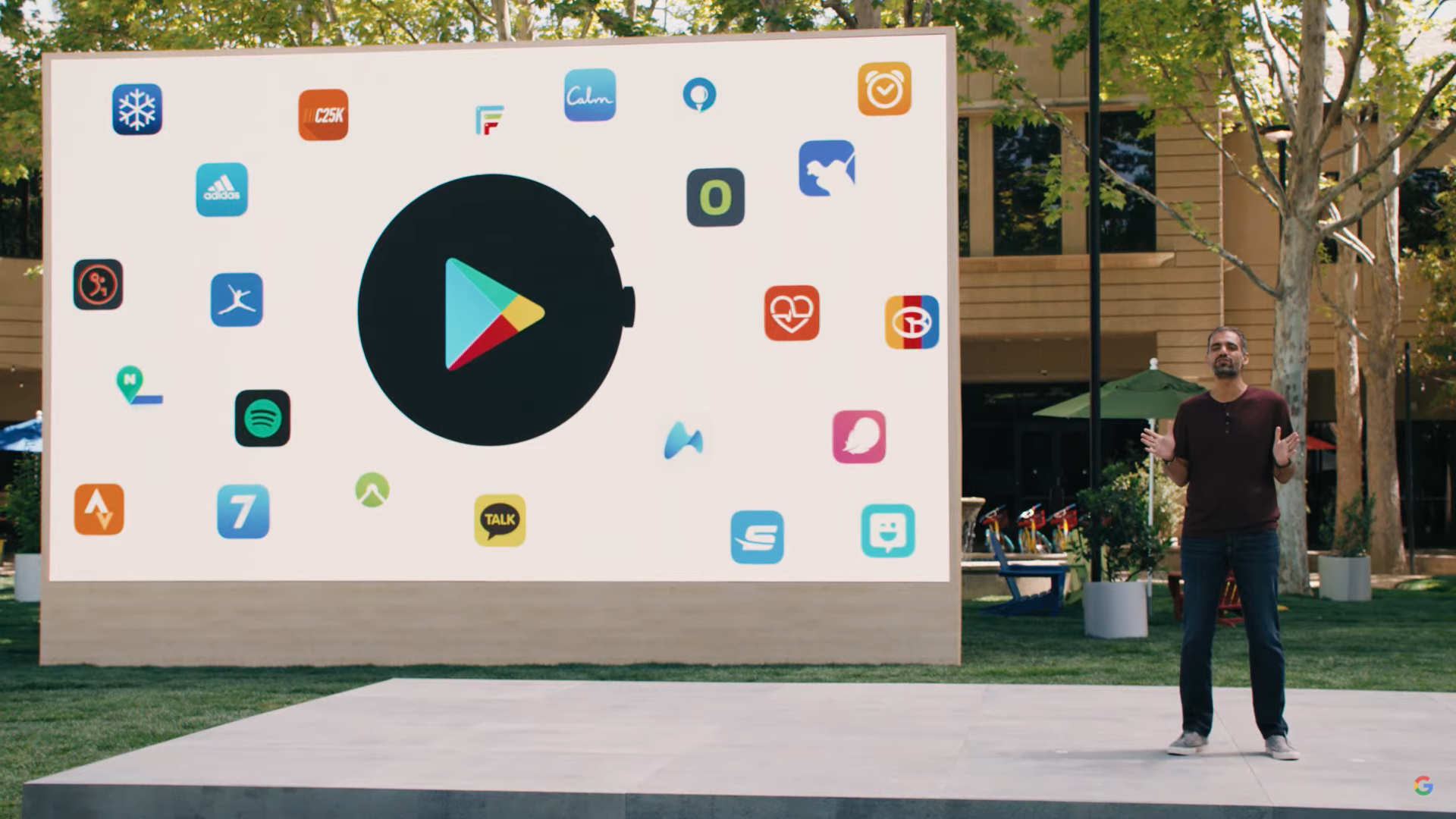
Remember this? It wasn't from Google IO 2022, but from the 2021 show. It's when the company showed off its new Wear OS 3 for smartwatches.
One of the things Google said then, was that we'd see Wear OS on a premium Fitbit (the health-tracker company is owned by Google). So far, though, we haven't seen this device.
Well, our Fitness & Wellbeing Editor has pointed out that we actually have - it's the Pixel Watch. This is a premium Wear OS smartwatch, and it has some Fitbit modes, so it's basically, though not exactly, what we expected.
That means we probably won't see an actual Fitbit-branded watch with Wear OS, sadly.
Given that Google teased its next 12 months of product launches, we've perhaps been reading between the lines a little too much... but does this mean there won't be a Google Pixel Fold?
Leaks said it was coming alongside the Pixel 7, but while that was teased - as was a tablet coming even later - there was no word of the foldable phone. So if it is coming, it might be at least a year off.
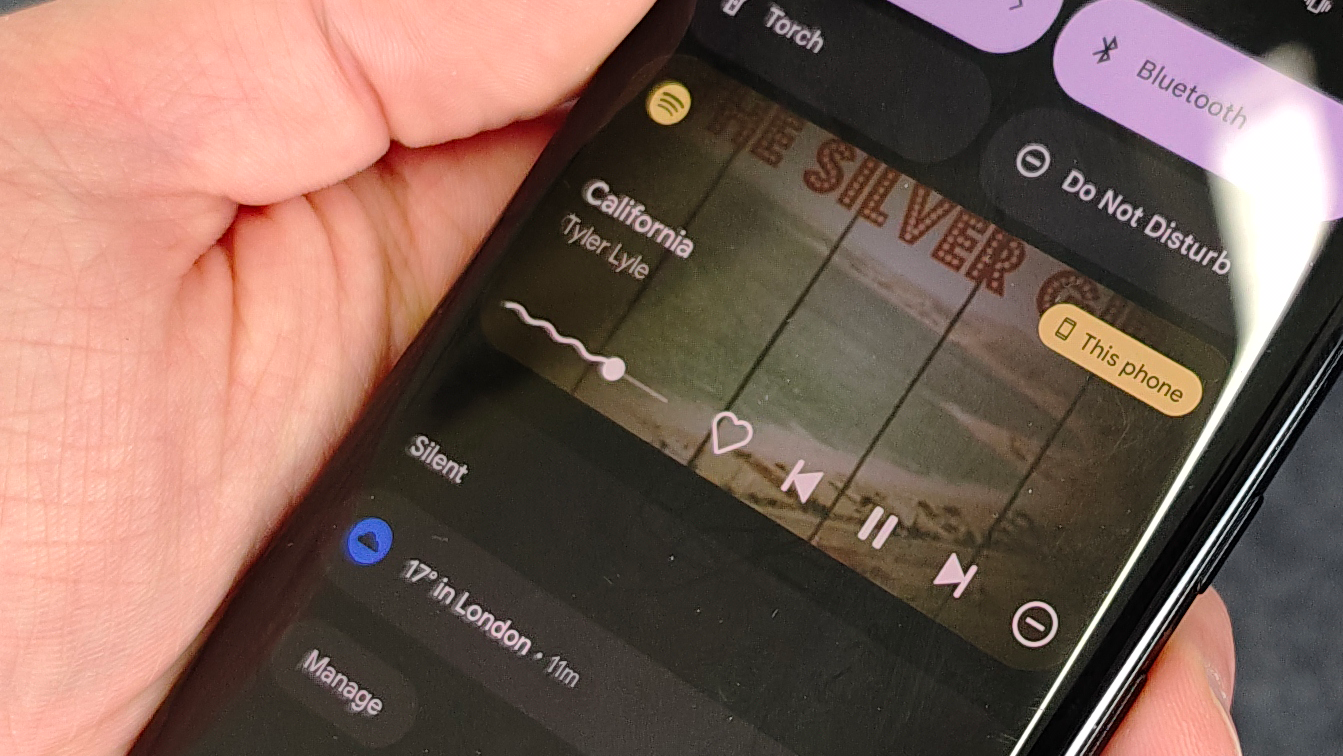
We've downloaded the Android 13 Beta and can confirm that one 'big' Material You upgrade is here: the line in the media player does indeed get wibbly-wobbly when you're playing music.
Except this line doesn't squirm at the beat of the music, as we thought it would. And doesn't move for the song that's left to play, only the amount of song that has already played. So it's not exactly a groundbreaking feature.
If you're interested in digital safety (which you probably should be) then you might want to check out our write-up of Chrome's virual credit cards.
These let you protect your bank accounts when shopping, as when you autofill bank information, it'll do so for a digital version of your card, not the actual card itself, making it harder for hackers to get your details.
One of the things Google made a song and dance about, was support for loads more languages, letting its devices and software be used by far more people... but it might have made a few mistakes.
People are pointing out that lots of the writing samples Google used are actually incorrect, with varying levels of severity.
I made a helpful annotation for everyone. Every single one that's not Latin- or Cyrillic-based is wrong (at least a little bit).I struggled a bit with displaying the Bengali script, but I made it work better than did this "Google" startup, whatever that is https://t.co/0nCKiOsJLh pic.twitter.com/R9mlxeuMvxMay 11, 2022
That's not exactly a good look for Google, especially given it's trying to make the point that it's supporting other languages, when it's actually messing them up. No-one who speaks one of these languages is going to be keen to use the software if they think the language is all wrong.